
the MAM: GREEK GODS
RETURN TO MYTH ABOUT MYTHS PAGE
Olympians were a group of twelve gods and goddesses who were considered the cream of the crop and were some of the most famed characters in mythology of all time. These deities were the greatest source of worship and praise of antiquity and were found in various artistic forms. The other gods mentioned in this segment were often of the same generation at these Olympians and helped serve their needs.
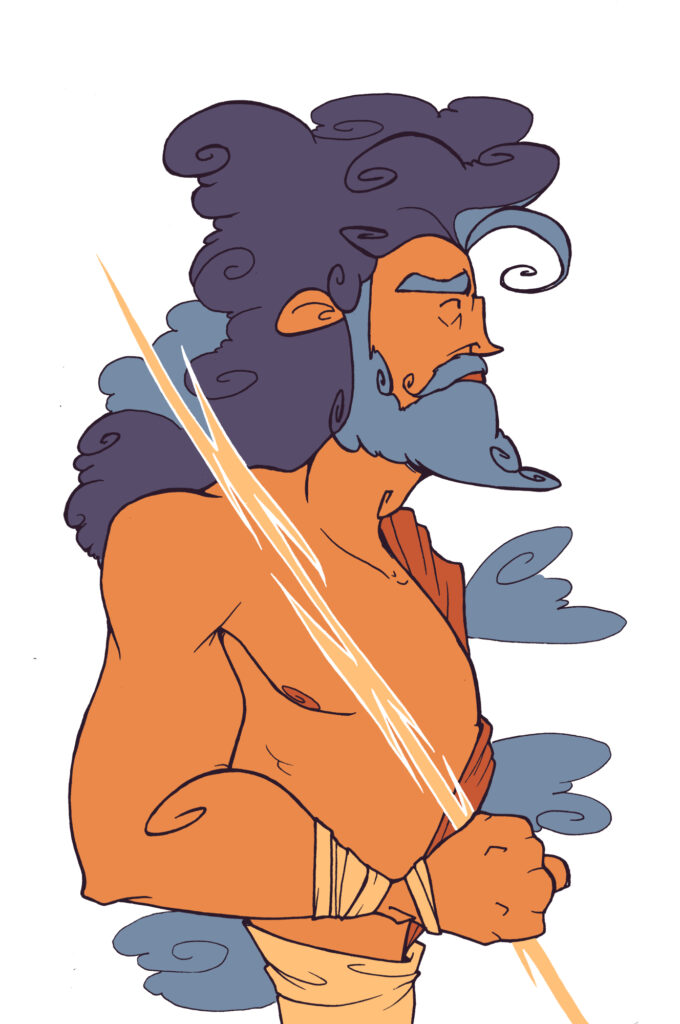
zeus
(ZEUS)
God of the sky, weather, law and order, destiny and fate and was king of the gods.
In some versions of the myth Zeus was perhaps the most famous and well-known god in all of Greece (both ancient and modern). A very abridged overview of Zeus would a little something like this:
Zeus was the last to be born of his six siblings by his mother Rhea and his father, Kronus. It was said that while the rest of his siblings were swallowed up by his father, Zeus was hidden away on the mountain of Dikte via his mother who used a giant stone as a replacement for Zeus. The young Olympian was prophesied to usurp his father which he did once he was raised into a strong youth, he socked his father in the stomach so that he regurgitated all of Zeus’ siblings in reverse order.
This was when the Titanomachy began. Zeus was given lightening bolts and Hekatonkhires (hundred-handers) via giant Kyklopes (cyclopes) and here he waged war on the generation preceding him. With the help of these, his siblings and a few traitorous Titans, Zeus succeeded and locked the Titans away in Tartaros.
After this Zeus, Hades and Poseidon essentially picked sticks to decide who would rule what. Zeus won the heavens and the other two were most commonly seen as the Underworld and the sea.
Later, Zeus overheard the voice of an oracle spouting a similar myth in which his future son (with Metis) would usurp him, he devoured her and in her spite she gave him a migraine large enough, Hephaistos split his head open with an axe, giving birth to Athena.
Zeus married, then, his sister Hera in which the two finally formed their famed coupling that would destroy many gods and mortals lives with his insatiable lust and her horrendous jealousy.
After catching Prometheus stealing fire for humans, Zeus was so insanely frustrated he not only sent Pandora with a jar full of plague and horrors to punish mankind but also chained Prometheus to a rock and punished him with an eagle forever gnawing on his liver.
Then Zeus wiped out mankind because he soiled them with his horrors (and Pandora). He sent a flood and ordered two mortals to rebuild society. Only afterward picking a fight with his grandmother, Gaia who was rather pissed by this point that he had captured all the titans and sent them into the pits of Tartaros. She sent a beast known as the Typhon to fight Zeus (this was after she caused the giant to revolt against Zeus in another war). He fought all of this and won (well, he was defeated by the Typhon before Pan restored him and he fought off the Typon one more time and defeated it).
Zeus seduced many mortal women (and many non-mortal women) enough so it was said he fathered around one hundred and fifteen children because he couldn’t possibly have sex without procreating as well. Many of these women were harmed, maimed, killed or transformed at the hands of his jealous wife, Hera. Although parents were really not supposed to have any favourite children, Zeus’ favourite, to absolutely nobody’s surprise, was Herakles.
Although Zeus was known for being rather troublesome and in very many cases the villain of various myths (though never framed as such) he occasionally was found doing a kind deed. He saved his wife on at least one occasion from assault and punished various men for horrific crime by… also banishing them to Tartaros.
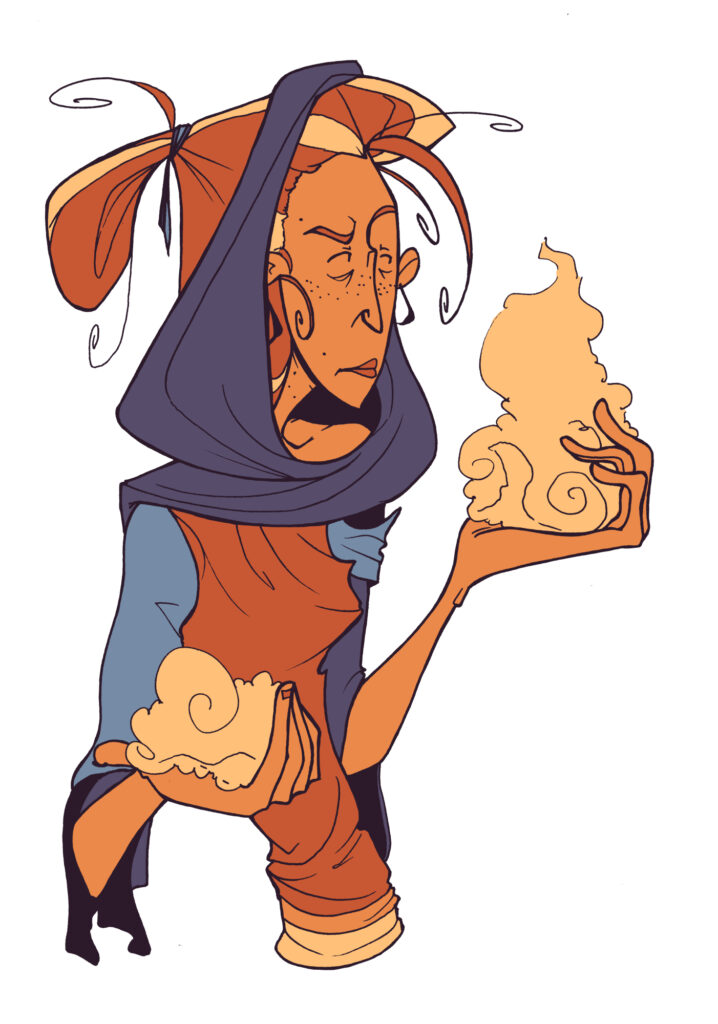
HERA
(HERA/HERE)
Goddess of marriage, women, the sky, the stars of the heaven and Queen of the Gods.
In some versions of the myth Hera’s story began a little something like this: she was the daughter of Titans Kronus and Rhea and was most definitely swallowed by Kronus when he ate all his children to avoid being usurped. This didn’t work, Hera was freed by Zeus who socked his and her father in the gut, expelling them all out in reverse order.
Most notable mythology in which Hera is included begins with Hera being wooed by her brother (and future horrible husband) Zeus. Initially the lustful god made attempts to win her love to which Hera ignored and rejected. Deciding to play a different tactic, Zeus created a thunderstorm and pretended to be a tiny helpless cuckoo bird outside her window. Hera, having great empathy for animals, saved this bird and held it close to her chest. He surprised her in a very horrible way and in Hera’s great shame and feeling quite exploited she agreed to marry Zeus. It was said they had a fantastic wedding.
After all this, Hera’s jealousy, shame and frustration simply grew and grew with each new partner Zeus chose to sleep with. It was said that he was ‘way too in love with Greece to stop himself’. Unfortunately, Hera didn’t (and perhaps couldn’t) put a stop to his horridness and found herself taking out her frustrations on every single one of Zeus’ consorts instead. This made Hera into quite a villain of her own undoing and a rather unfavourable character to many even now.
Especially, since Hera didn’t only persecute Zeus’ consorts but sometimes her very own son. It was said she gave birth to Hephaistos without a male consort of her own. In some versions she welcomed Athena with open arms as one of the very few children not created by her nor any other consort of Zeus (except Metis who was swallowed up…) in different versions Hera is just as frustrated. It was said she was so frustrated she created Hephaistos out of spite and a proof that she, too, could create a child without consort. It was said, however that, unlike Athena, he was disfigured, a child not born in her image of perfection and, because of this, she tossed him herself from Olympus out of sheer disgust for her child. Of course other versions say that it was Zeus who cast him down as Hephaistos sided and aided his mother in a quarrel between the King and Queen of the gods and when he fell he was hurt badly enough to be disabled.
Not only was Hephaistos a source of contention with Hera but so was Herakles. Hera was known to have loathed Zeus’ illegitimate and favourite son so much she was the direct cause and villain of his story. She was the one to have cursed him into killing his wife and children after attempting to murder him both in the womb (stopping his birth) and as a child (sending two serpents which Herakles killed). She put him through labours… during his labours and sent raging storms against him on his way home from Troy. Oddly enough, after his death the two became friends so much that she allowed him the chance to marry her daughter, Hebe.
Later, perhaps to instil some sort of irony or karma, Hera was nearly taken advantage of by the ridiculous mortal, Ixion who thought he could make an attempt and not, somehow, because by Zeus who affixed him to a fiery wheel forever rolling through Tartaros.
Hera wasn’t entirely known for her horrors, she did help her own favourites such as Jason and his Argonauts fetch the golden fleece. She also Favoured the Greeks in the war against Troy.
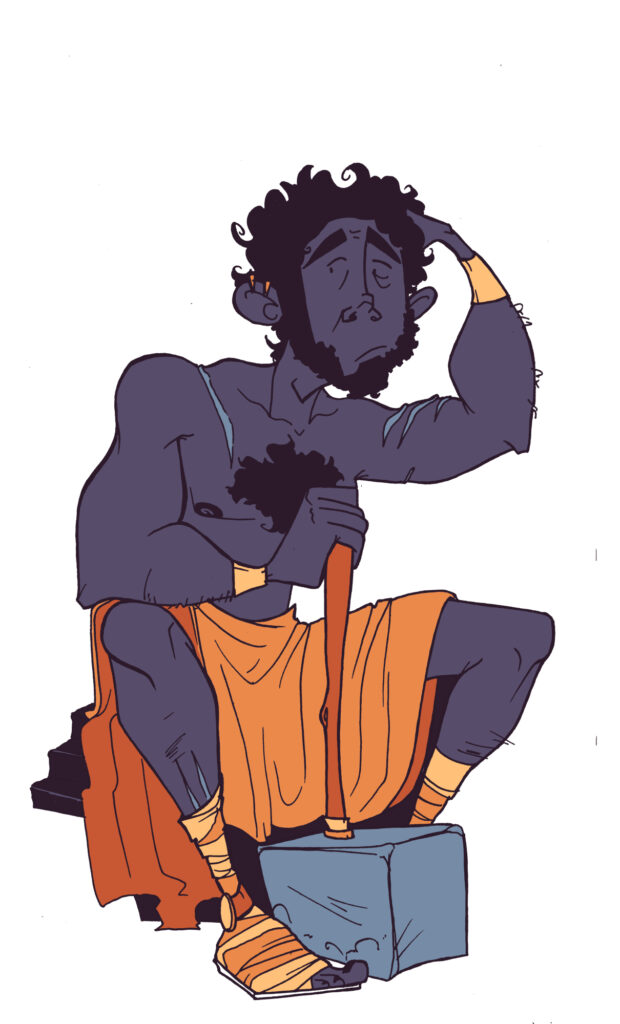
HEphaistos
(HEPHAISTOS/HEPHAESTUS)
God of fire, smiths, craftsmen, metalworking, stonemasonry and sculpture.
In some versions of the myth Hephaistos was a character with a great fall and a great redemption all in spite of what some myths tellers might have described as a disability though admittedly, the only evidence of his disability was that he was ‘shrivelled’ or ‘small’ of foot in Hera’s own words.
Hephaistos, aside from this was most notably known for the following myths in which he starred and was the centre of the story:
It began with Hephaistos’ fall from Olympus, different stories state different reasons and sources of his tumble. The first was at the hand of his own mother, Hera who managed to create and birth him with the help of no consort in retaliation to Zeus’ ability to birth a child from his own head (Athena). It was said that unfortunately Hera’s attempt lead to what she called ‘shrivelled of foot’ child and very unfortunately was so disgusted with her efforts she tossed Hephaistos from Olympus. Luckily he landed in the sea where he was raised by Thetis and Eurynome. In another version it was Zeus who cast him down when Hephaistos tried to protect Hera from Zeus’ advances. He was tossed to the island of Lemnos instead and taught how to be a master craftsman by the Sintians.
Later, Hephaistos regained his access to Olympus despite his exile. It was said that he created a chair for Hera as a gift which was cursed so that she was chained to it when she sat in it. When the rest of the gods asked him to come home to Olympus and save/fix his mother’s situation he refused, stating that he had no mother. Eventually, Dionysos was sent to fetch Hephaistos to bring him back, though not until they both perhaps commiserated, Dionysos getting Hephaistos drunk on wine.
Quite unfortunately, Hephaistos was the butt of a lot of horrible jokes, one instance Aphrodite is essentially cursed into being the wife of Hephaistos for all of eternity and while Hephaistos seemed rather happy with this, Aphrodite was not and often slept with others, including Ares. It was said that Hephaistos attempted to speak to other gods about Aphrodite’s habits and found that nobody believed him. He devised a plan, setting a trap in his bed in which he captured both Ares and Aphrodite in the middle of their scandalous acts. None of the gods really seemed to care about this too terribly much and so Hephaistos wound up with a few other consorts of his own after that.
One of his choices for consorts was Athena who completely rejected his advances and, not taking ‘no’ as a proper answer, attempted to ejaculate on her only for Athena to shift out of the way, causing him to impregnate the earth (…Gaia…) with a child never to be really spoken of again.
Aside from this, Hephaistos was commonly mentioned for his skills of crafting various amazing objects, Pandora aside, which included: Achilles’ shield, Hermes’ winged helmet and sandals, Aphrodite’s girdle, Helios’ chariot, Herakles’ clappers, Pelops’ shoulder and Eros’ bow and arrows.
The god was said to have fought notably once during the Trojan war where he fought a god named Skamandros with fire.
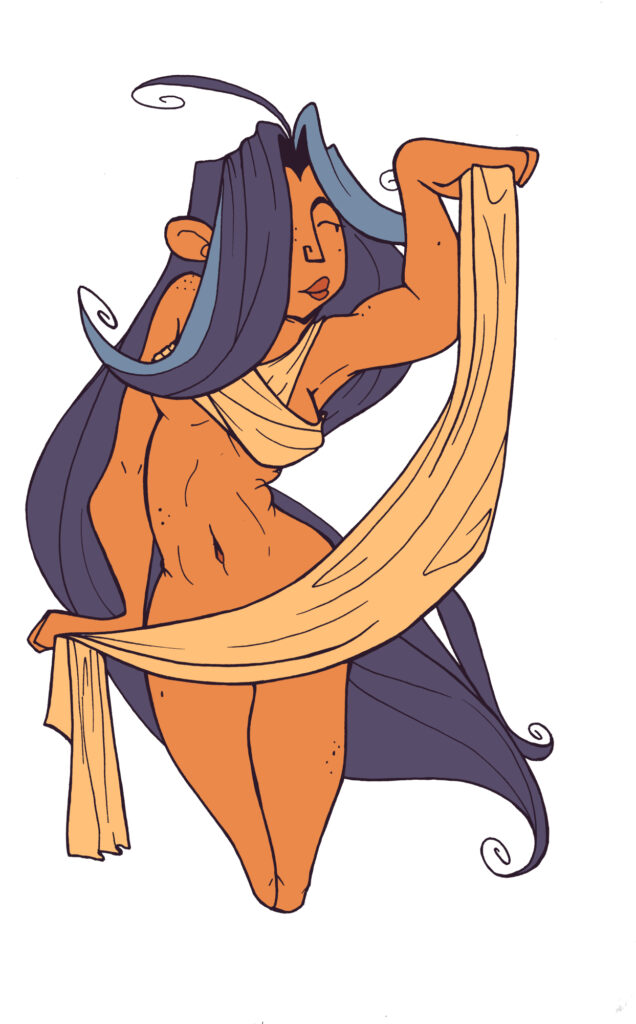
Aphrodite
(APHRODITE)
Goddess of love, beauty, pleasure and procreation.
In some versions of the myth Aphrodite was initially a primordial goddess. In her most original myth, Ouranos’ penis was cut off by Kronus and it dropped into the ocean. It was said that Aphrodite was created from the sea-foam in its wake. It was said the blood drops from this gruesome act created giants, the furies and the meliae. However, in more recent mythology, Aphrodite was repurposed as the daughter of Zeus and Dione and thus became a part of the Olympian pantheon.
Later Aphrodite would be known as the most beautiful and most desired goddess. There were various versions of her accounts with Ares and Hephaistos. In two versions of her myth Aphrodite as scandalously unmarried but Ares is definitely her consort. In two other versions she was married to Hephaistos who either won her as a prize after he trapped Hera in her binding chair and exclaimed he wouldn’t let her go unless he was wed to Aphrodite. In another version Zeus married her off to Hephaistos so that none of the other gods would spend too much time fighting over her. Neither of these final two options gave her much freedom, admittedly. It was said that later she slept with Ares regardless of her marriage to Hephaistos and Helios spied her doing so and told on Aphrodite to her husband. Hephaistos was given a net in which he caught Aphrodite and Ares in the act of having sex and showed the other gods that Aphrodite was, in fact, cheating on him. The rest of the gods were rather unamused at being brought forth for something so beneath them and sided with Ares, naturally. Aphrodite ran off then feeling rather humiliated.
Aphrodite later found mortals with whom she fell in love, namely Anchises who was too afraid to sleep with her until she tricked him to it. She had to smite him in some way after he might have nervously mentioned the affair to his comrades. In another myth she fell in love with Adonis. After his mother was turned into a tree for sleeping with her father because she boasted how she was prettier than Aphrodite herself, Aphrodite found the boy and took him to the Underworld where he could grow up safe at the hands of Persephone. Adonis wound up being so handsome, the two goddesses fought over Adonis so much so that Zeus intervened so that Adonis would spend a third of the year with Aphrodite and a third with Persephone and the final third with whomever he chose (he chose Aphrodite).
In the Trojan war she sided with her favourites, Paris and Aeneas which also meant that she participated in the judgement of Paris. This took the form of an apple created by Eris which was said to belong to ‘the fairest’. Not wanting to be the one making this choice, Zeus gave the apple to Trojan prince, Paris. Paris could not decide and so settled on which bribe was the best (Aphrodite promised him the hand of Helen in marriage and he went with this choice). Aphrodite was also harmed in this battle at the hand of a horrid little mortal while she was protecting her son, Aineias.
Otherwise, Aphrodite appeared in various smaller myths involving various lovers: she brought Pygmalion’s statue to life and put Psyke through a great deal of trouble when she fell in love with Aphrodite’s son, Eros.
The goddess of love was also seen with various attendants including: Eros, the three charites, the three horae, Harmonia and Preipos (only in some versions).
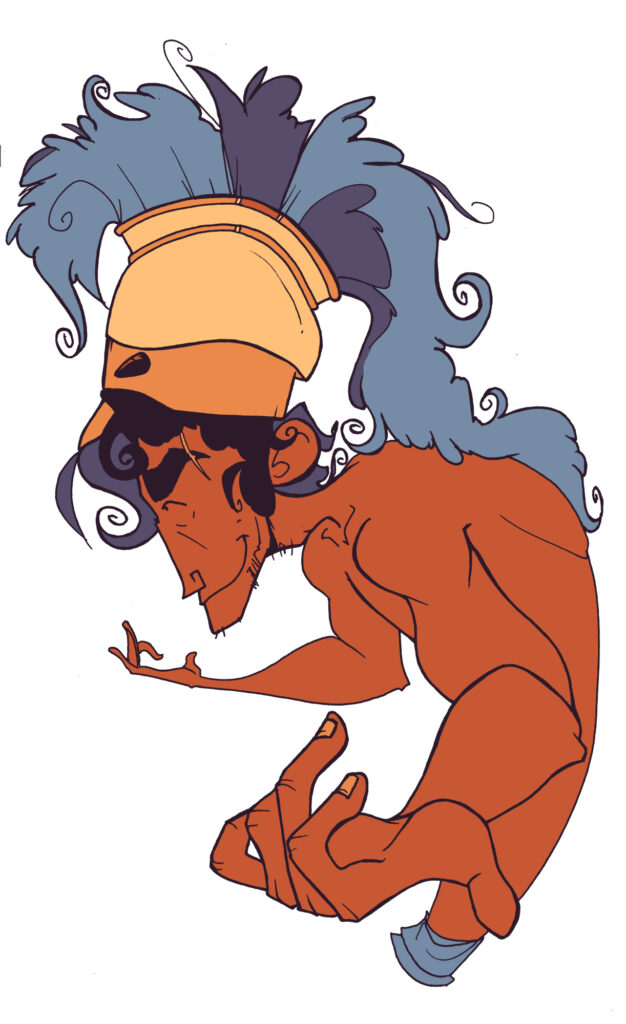
ares
(ARES)
God of war, battle lust, courage and civil order.
In some versions of the myth he was well known for having had an affair with the goddess of love, Aphrodite behind her husband, Hephaistos’ back. Ares and Aphrodite were not really all that sneaky about the fact and were spotted by Helios who told on them to Hephaistos. He eventually devised a plan, and exposed Ares and Aphrodite (quite literally) to a bunch of other gods who were none too shocked at the matter. Ares got off without much shame to bruise his massive ego.
Later, Aphrodite fell in love with Adonis who was quite a handsome young man. This perhaps bruised Ares’ ego much more, and out of great jealousy he turned himself into a boar and, while Adonis was out hunting, he gorged the young man to death.
In an unrelated myth, Ares turned his daughter, Harmonia and her husband, Kadmos into serpents after Kadmos lamented over his killing a sacred dragon and Harmonia, distraught at his transformation, wished for the same fate. Ares wasn’t one to stop or really question the motive behind anything and did as she wished which was rather supportive of him.
Ares was, actually quite supportive of his daughters, when Alkippe was taken advantage of, he slew her abuser and was then brought to some kind of court where Ares was tried in an Athenian court but later acquitted. He also actively supported all of his Amazon-Queen daughters in battle and was most especially proud of Penthesileia who participated in the Trojan war.
It was no surprise that Ares also participated in the Trojan war on the side of the Trojans (a particular common stance was that Ares always seemed to be on the side opposing the Olympians though he was often counted as and claimed as one). He was wounded by the Greek hero, Diomedes who drove a spear into his side. Afflicted, hurt and maybe a little bit bruised in his fighterly ego, Ares fled back to Olympus whining and cursing about the amount of pain he was in. This wasn’t the first time Ares was wounded in battle, he didn’t handle those moments very well in each case either. During a battle between Herakles and Ares’ giant Kyknos he intervened, got hurt and fled back to Olympus. It was also said that when the giants invaded Olympus themselves he was captured and imprisoned in a bronze jar only to be rescued, eventually, by Hermes.
Ares got to return the rescuing favour later, instead of rescuing Hermes he rescued Thanatos from his own shackles, having been bound by the cunning, Sisyphos.
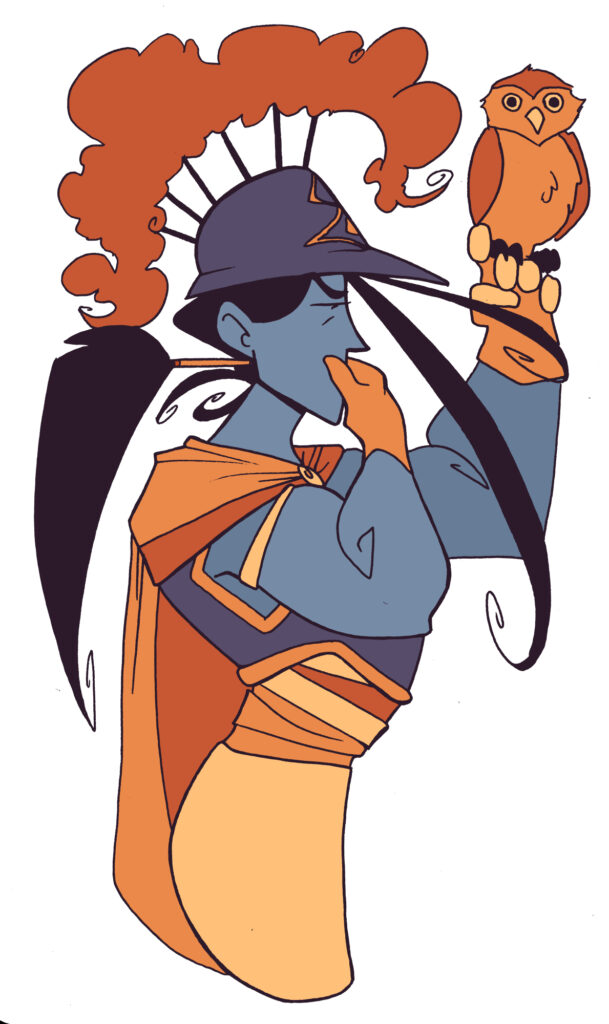
athena
(ATHENA/ATHENE)
Goddess of wisdom and good counsel, war, the defence of towns, heroic endeavour, weaving, pottery and various crafts.
In some versions of the myth she was born via her mother who was swallowed by Zeus after a very similar usurping prophecy turned up once more to spite Zeus in the same way Zeus usurped Kronus. Terrified, he swallowed Metis to prevent this fate instead Zeus gave himself a splitting headache because Metis was busy creating armour for the child she was pregnant for. Unable to handle the pain anymore, Zeus asked for Hephaistos to crack his head open to which the young god very much obliged. This then gave birth to a woman, fully clad in armour and ready for battle, also known as: Athena.
Later Athena won a contest against her uncle, Poseidon, both of whom were battling to become the patron god of Athens. She produced the first olive tree, Poseidon the first horse and the king of Athens at the time, favoured Athena’s offering as it brought them wood, food and oil.
It was also only natural that Athena was a great participant in various wars including the war between the Olympians and the giants in which she stripped off the skin of the Titan Pallas after his defeat and used it as some sort of aigis (which is considered armour in some cases); she also participated in the Trojan war on the side of the Greeks, only attacking her own side after they failed to punish Ajax for violating her Trojan shrine. It was said during this war in particular she really favoured Odysseus in which she helped him in his travels home, fixing his mistakes and guiding his ship into rescuing damsels and sneaking him out of the troubles he fell into.
Athena was known to favour very many of the heroes including Perseus in his quest to slay Medusa. Athena and Hermes appeared to Perseus and gifted him with the tools he needed in order to slay the beast: a polished bronze shield and an adamantine scythe. Athena helped Jason and his argonauts in the construction of their ship. She aided Bellerophon in the taming of the winged Pegasos. Athena was also very well known as the helper to Herakles during his various labours and often was the one feeding him small hints as to the defeat of various beasts, most notably the Hydra. Later she was depicted as holding the sky up while Herakles defeated Geryon.
In her final myth, in a moment most petty, Athena was known to have held a small contest against Arakhne who boasted of her insane abilities of weaving. She claimed she was even a better weaver than Athena. Athena took this as a challenge and the two competed. In the end, Arakhne one and in some versions boasted loudly about her win, in others Athena was so embarrassed she turned Arakhne into a spider.
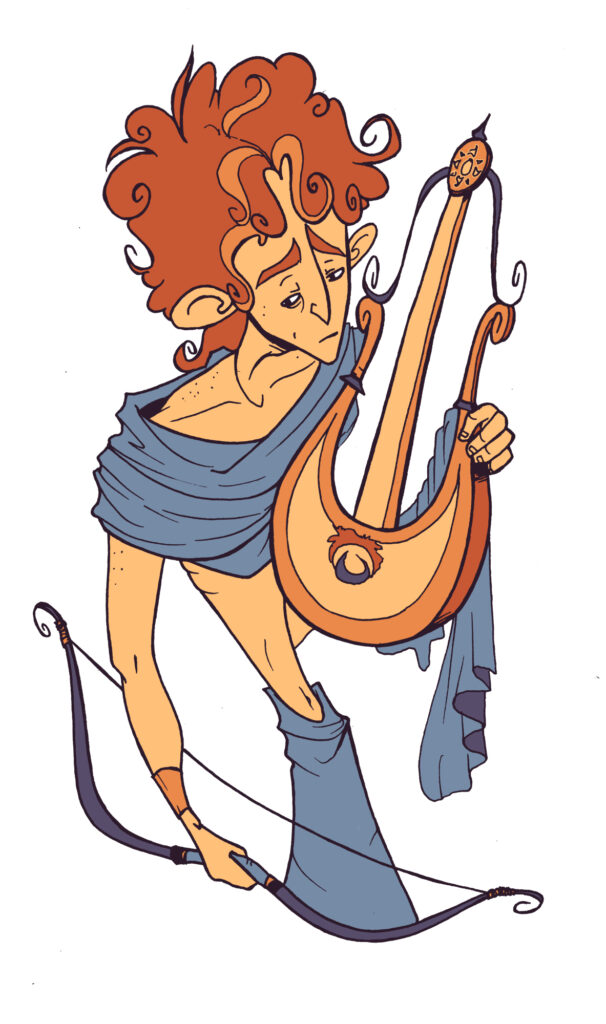
apollo
(APOLLO/APOLLON/PHEBUS)
God of the sun, prophecy and oracles, music, song and poetry, archery, healing, plague and disease and the protection of young boys.
In some versions of the myth it was said that his mother, Leto, having been the consort to Zeus was cursed by Hera so that she could not give birth on any land. She fled to Delos, a spot of land created by her sister, Asteria that was a loophole in Hera’s curse. Here she gave birth to Artemis and Apollo who was born clutching a golden sword.
Apollo later perfected the art of archery with his sister, Artemis and taught it to the humans. Hephaistos later fashioned a set of bow and arrows for Apollo to use and the youth went hunting for the massive python (a dragon Hera sent to chase Leto so that she wouldn’t be able to give birth to Apollo and Artemis). He slew it expertly in the cave of Delphi. Zeus, while proud of his son for his efforts, wasn’t into the idea of upsetting Gaia whose child this was and decided Apollo needed to be punished. Apollo was banished from Olympus and told to purify himself before he would be allowed to return. Apollo was to slave away for nine years at the hands of various kings and set up the Pythian games in honour of Gaia and her murdered child. Only then was the god allowed back on mount Olympus. Apollo was also gifted by his father: golden tripod, bow and arrows, a golden chariot drawn by swans and the entire land of Delphi.
Apollo was known for two other deeds in which he did in his mother’s name. He and his sister slew Niobe’s children after she boasted of her ability to procreate and give birth to fourteen children while Leto only had two. Apollo also slew Tityos (with his newly fashioned bow and arrows) who attempted to ravish Leto.
The sun god was also known for his various affairs with women, including the most popular: his insatiable and incurable lust for Daphne who fled him until she begged the gods for an escape and was turned into a tree. He also slept with Coronis who was later murdered by Artemis for cheating on Apollo. He was also known for favouring some men, including Hyakinthos who was killed by the discus Apollo threw in an attempt to show off to the young man. The discus veered, hitting Hyakinthos in the head (and in some cases, severing it). Apollo turned him into a flower in his memory.
Apollo was rather easy to anger: he played against a satyr in a musical contest and when he lost, flayed the satyr to his death. When his son Asklepios was killed by a cyclops via a lightening bolt, Apollo murdered him. He also fought against Herakles for the golden tripod when the young hero stole it from him.
Like many of the other gods, one of Apollo’s final big escapades was during the war on Troy in which he brought a massive plague to the Greeks and helped Paris slay Achilles (needless to say he was on Troy’s side).
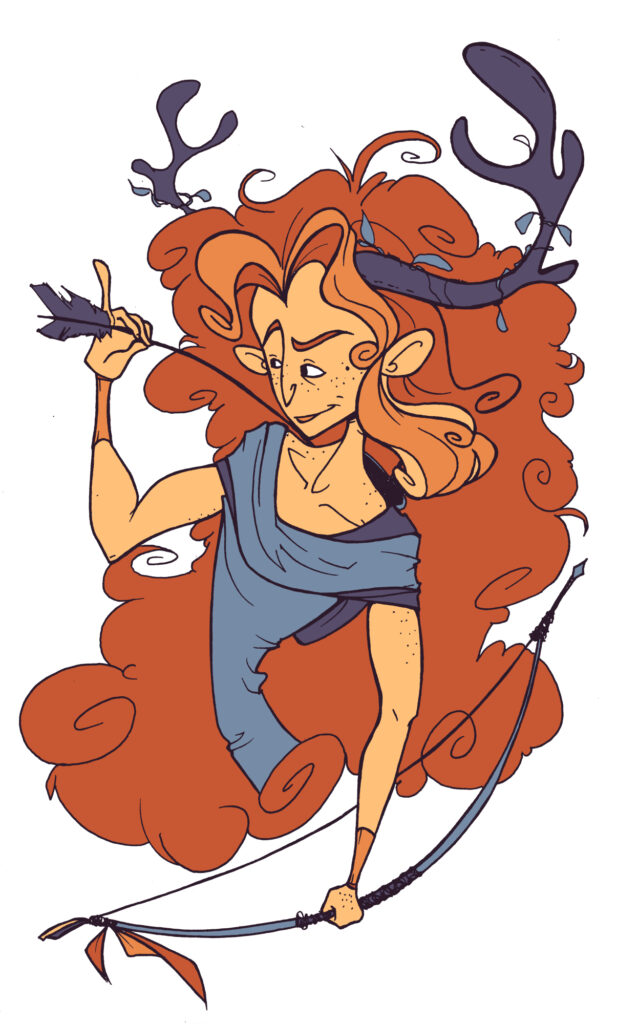
artemis
(ARTEMIS/PHOEBE)
Goddess of the moon, hunting, the wilderness and wild animals, childbirth, death and disease, protectress of young girls until marriage.
In some versions of the myth her mother was hounded by Hera all throughout her pregnancy so that Leto was forced to find refuge on the island of Delos. It was said that after she gave birth to Artemis, the young goddess matured so quickly she was able to assist her mother as a midwife with the birth of her younger, twin brother, Apollo.
Artemis’ temper easily rivalled her brothers, Kallisto (one of her handmaidens) was seduced by Zeus in the form of Artemis. Artemis found out Kallisto was pregnant and because Kallisto blamed her for the pregnancy and the result of a huge miscommunication, Artemis turned Kallisto into a bear and exiled her to the wilds. In another instance of anger, a hunter by the name of Aktaion spotted her bathing with her nymphs and spied on her . Artemis spotted him in return and turned him into a stag so that he would, in turn, be torn apart by his own hunting hounds. Artemis was also known for sending down the Calydonian boar as a punishment to ravage the lands of king Oineus because she was being left out of various godly sacrifices.
Artemis often hunted with the very handsome giant, Orion who was said to be the companion of the goddess but really was the source of jealousy for her brother who adored Orion himself. Jealous of his sister’s ability to hang out with the man, he tricked Artemis into killing him when Orion went to bathe in the lake. She shot him with her arrows, not realizing it was him and in her sorrow she turned him into the constellation: Orion.
In the war of the giants against Olympus, Artemis turned herself into a doe and darted around two giants so that they tossed spears in their attempts to kill her and wound up killing each other.
Artemis naturally also participated in the Trojan war like the rest of the Olympians. She sided with her brother and the Trojans which explained greatly why she stirred trouble with the Greeks, stirring and agitating the sea so that they could not leave the harbour. King Agamemnon was forced to sacrifice his daughter, Iphigenia. Artemis snatched her up and away to safety and replaced her with a doe. During the war itself Artemis played a role in which she faced off against Hera who supposedly took her bow and arrows and beat her with them so that she was forced to flee back to safety: Olympus.
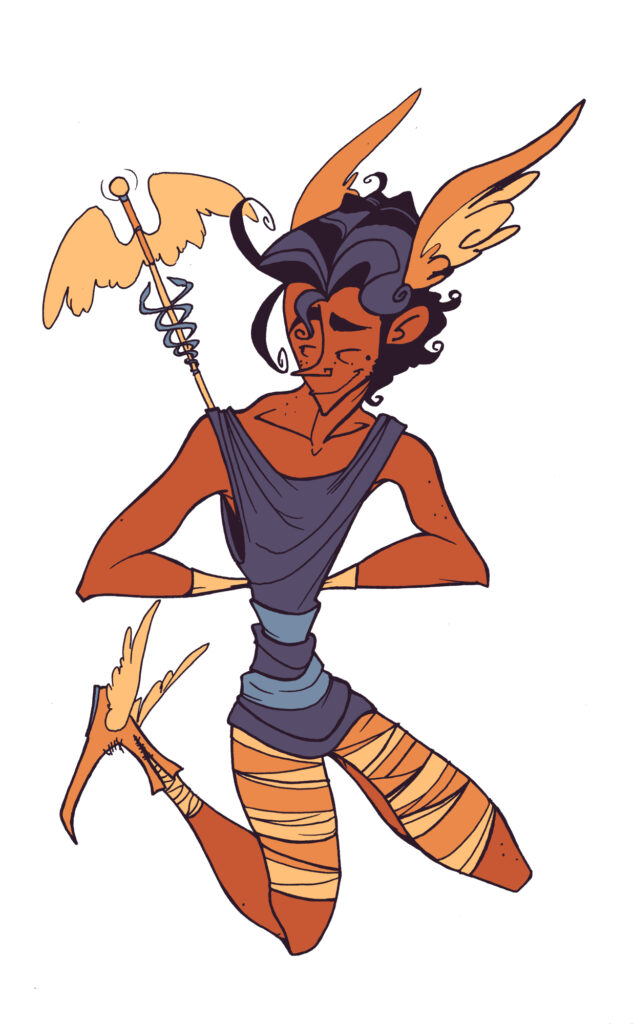
hermes
(HERMES)
God of herds and flocks, travellers and hospitality, roads and trade, theivery and cunning, heralds and diplomacy, language and writing, athletic contests, astronomy and astrology. Also known as the messenger of the gods.
In some versions of the myth it was said that while he was a bringer of good luck, he was also a great trickster god. When Hermes was only a newborn it was said that he snuck out of his crib and crawled off to steal his brother Apollo’s cattle in the night. Apparently in some versions he had killed two beasts and hid the rest of his brother’s cattle in a cave before pretening to fall back asleep in his crib as if nothing had ever happened. Apollo, however, was known for having rather prophetic visions and obviously figured out the culprit behind the theft. Of course, nobody really believed him. Apollo sought out Hermes’ mother who may as well have laughed at him for thinking up this ridculous story. Apollo, not convinced, took Hermes to Zeus who demanded Hermes return Apollo’s cattle at once. Hermes attempted the ‘I didn’t do it’ schpeel which, unfortunately, did not work. Hermes returned Apollo’s cattle, playing his little lyre and syrinx. Apollo, god of music among all his other titles, thought this sound was amazing and while miffed about his cattle, was easily swayed into calling a truce and making friends with his younger half-brother. It was said that the two of them became quite close after that.
Zeus, meanwhile was so amused by Hermes’ antics he almost immediately set him up as one of the twelve Olympians, a group of gods specifically selected for their excellence.
Hermes was hired to do many deeds most gods (especially Zeus) were not fond of, including: killing the giant Argos who was sought out by Hera to keep an eye on one of Zeus’ consorts, Io; saving Dionysos from the flames of his birth; rescuing Ares from a brazen vessel; and tying Ixion to a flaming wheel.
The messenger god was not without his own favoured heroes and aided Perseus in his attempts to slay Medusa and save Andromeda. Likewise, he was also said to have provided Odysseus with herbs so that he wouldn’t be charmed by the witch, Kirke when he washed up on her island with what was left of his crew.
Hermes was a rather interesting character in that he was present in various mythology and very rarely starred in his own tales. He was a cunning and great supportive character to a bigger picture which also made the god a rather interesting and sneaky-like sort.
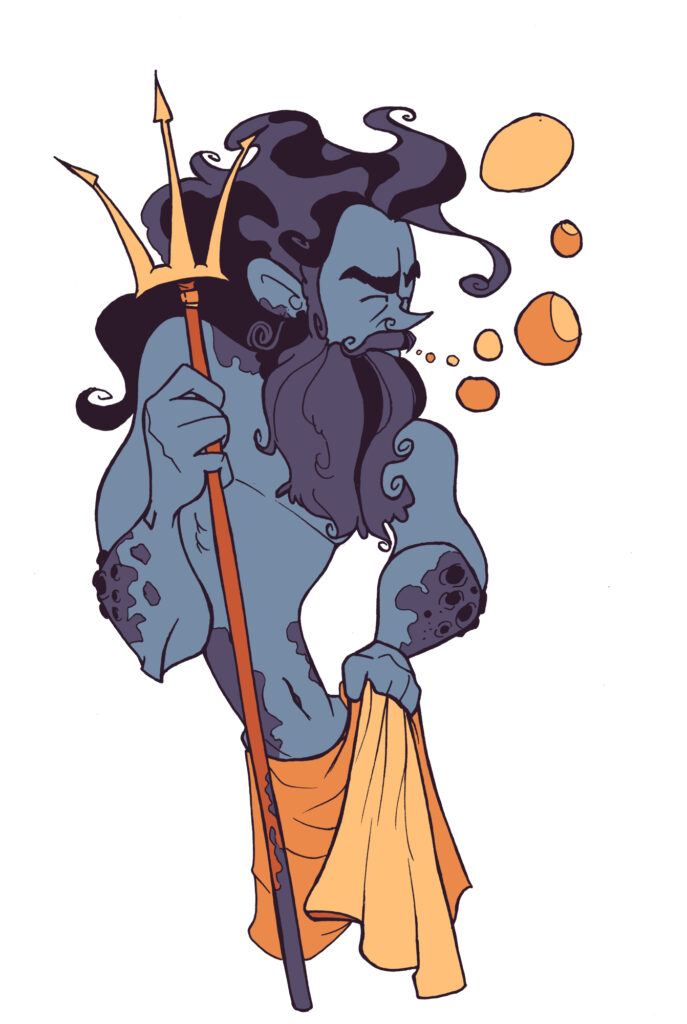
poseidon
(POSEIDON)
God of the sea, earthquakes, floods, drought and horses.
In some versions of the myth began as at least five other myths do: he was devoured by his father, Kronus who later was punched in the gut so hard he spewed all his children right back out.
Poseidon’s myth follows a similar path as Zeus’ in that he also participated in the Titanomachy, the cyclopse giants created a weapon for him and while they gave Zeus thunder, they gave Poseidon a trident which would one day become the symbol of the sea. They won the war against the Titans and the three brothers (Poseidon, Zeus and Haides) drew lots as to who would rule which domain, Poseidon won the sea.
It was said that at some point afterward Poseidon entered a contest against Athena as to who would gain their right to be patron god of Athens and in order to woo the king to his favour, produced the very first horse as a gift. Unfortunately that didn’t really work and, with the same horrid temper as his brother, Zeus, Poseidon set his anger into motion and afflicted the land with a horrible drought.
Later on he, (along with Apollo) were stripped of their ‘divine authority’ for a very brief stint for having dissed Hera’s scheme and made to serve the king of Troy (all this just before the famous Trojan war). This king, smartly, had them build proper walls around the city and promised to reward them well… and then he didn’t. Out of frustration, anger and vengeance, Poseidon sent a sea-monster to attack Troy. Herakles later killed it.
Poseidon was also just as lustful as his brother and had various consorts of various genders and had very many offspring. It is said in some versions that his wife is Amphitrite though she isn’t highly mentioned in any well known myths and legends. Other consorts of his included: Gaia, Demeter, Aphrodite, Medusa and Pelops among and exhaustive list.
This sea god was well known for having several children with all of these consorts and it was said that a great many of them wound up being somewhat monstrous. One of the most famous of his children included Polyphemos who howled for his father’s help after Odysseus stabbed him in his one good eye and made a fool of him.
Alternately, the god was also known to have fathered Theseus who grew up to be a very well known hero who fought alongside Herakles and fought the minotaur, who, in some cases may have been the offspring of a bull he or Zeus may have created.
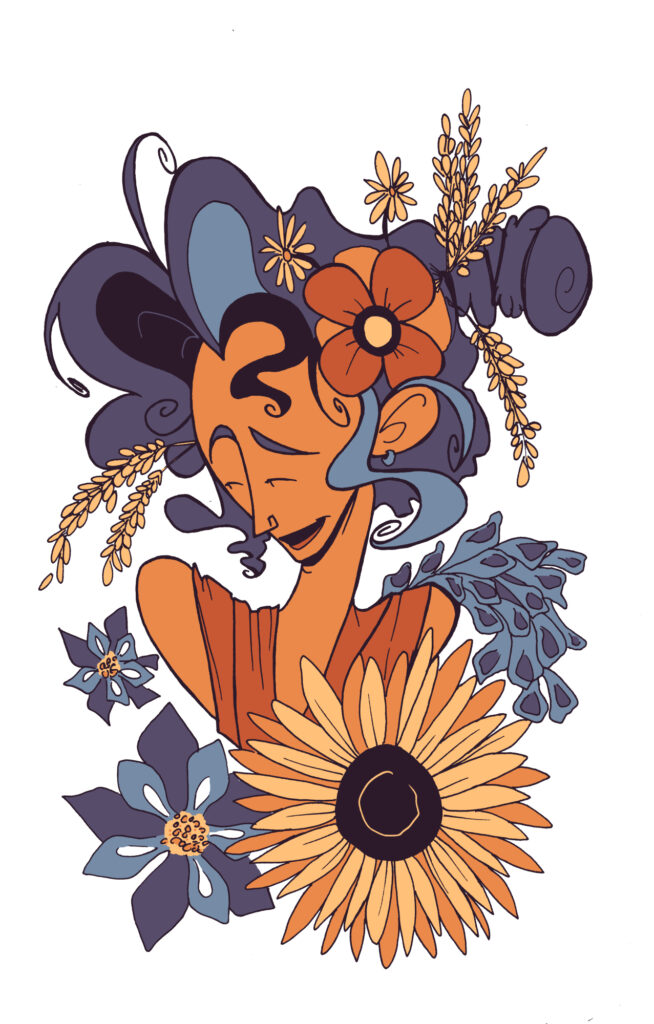
demeter
(DEMETER)
Goddess of agriculture, grain and bread, the harvest, growth and nourishment, who presided over the fertility of the earth.
In some versions of the myth Demeter also began with the myth of Kronus in which she was swallowed up by her father before being released by Zeus. She did participate in the Titanomachy, it was said, but her role wasn’t greatly mentioned in all too much detail.
The most well known myth that she was a part of was the myth of the abduction of her daughter, Persephone. Zeus offered her daughter’s hand in marriage to Haides who later abducted her. Demeter was distraught, not having seen her daughter in quite some time she scoured the Earth in search of her. In some cases she had the help of Hekate, in others she borrowed her torches in order to better search for her. It was said that, due to the fact that Helios was the sun and saw everything, he also saw Haides capture Persephone and so told Demeter about it and about how Zeus conspired in the matter. Livid, Demeter took this up with Zeus, enraged by the entire ordeal. Zeus admittedly, didn’t take Demeter seriously until she refused to bless the harvests and soured all the crops awaiting the return of her daughter. Zeus conceded and sent Hermes to retrieve her daughter, not before Persephone had already eaten the fruit of the Underworld. This devastated Demeter and so explained the seasons, the winter months, when Persephone returned to the Underworld, Demeter’s sorrow would be so great as to turn the Earth cold and barren of fruitful harvest.
During her frantic search for her daughter, Demeter took part in a myth involving mortals who had housed her in her great despair. As thanks for their kind gestures, Demeter was set on turning one of their sons into a god and secretly anointed the child in ambrosia before setting him into the fire to ‘slowly burn away his mortality’. The mother caught Demeter in the act of burning her child and screamed. Demeter only now realized what an image this must have been, abandoned this attempt and, instead taught their other son the tricks and secrets of agriculture so that he might venture forth into the world and spread his knowledge.
Later, it was said that Demeter was sought out by Poseidon. Demeter was often considered the mare-goddess, closely linked with Artemis and, one day, fled the advances of Poseidon in the shape of a mare hidden among a group of horses. Unfortunately her divinity could not be hidden in this way and Poseidon, in the shape of a stallion, mounted her all the same. In this myth, Demeter was known to have mothered various beasts with Poseidon.
In a final myth she was rather known for, Erysikthon was attempting to cut down her sacred grove and in catching him doing so, Demeter set her anger forth and cursed him with an insatiable hunger in which he eventually ate himself to death (literally devoured his own limbs).
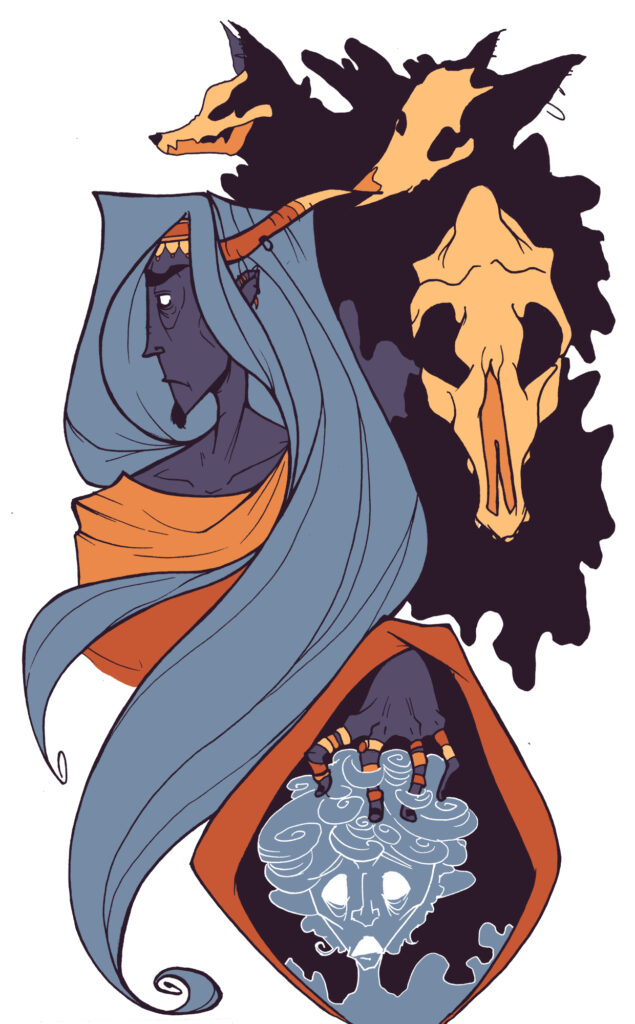
haides
(HAIDES/HADES)
God of the dead and king of the Underworld.
In some versions of the myth, his began, yes, also like many of his siblings, in which he was devoured by his father, Kronus, before he was released by his brother, Zeus who defeated him. Together they all fought in the Titanomachy where they completely destroyed the Titans and locked them away in Tartaros. Here the three brothers drew lots and, well, Haides was the last to choose and so wound up with a kingdom of the dead in the very dismal Underworld.
His most popular myth involves Haides admitting to Zeus his want for a bride to rule the Underworld at his side. The place was rather dismal and lonely without company. Zeus with his rather bright idea, offered his daughter, Persephone’s hand in marriage, naturally not talking to Demeter first and asking her if she was okay with it, leading to trouble much later. Haides considered the idea and wound up coming to the conclusion that he would never be able to woo her and decided, instead, to abduct her. He appeared before Persephone in what was reported as a black chariot emerging from the cracking ground. Persephone didn’t flee and, instead watched in either: horror, fear or curiosity. Here Haides plucked her from the fields in which she was picking flowers with Artemis and carried her off to the Underworld.
In the meantime, Demeter was throwing a fit large enough for Zeus to have reconsidered his offer in his daughters hand to Haides. He sent Hermes to retrieve her from the Underworld in which Haides complies rather willingly. He even went so far as to tell Persephone, should anyone (mortal or god) treat her with any ounce of disrespect he would punish them forever after. It was said that after this when the chariot was being prepared he either tricked Persephone into eating the pomegranate seeds or merely offered them to her which she very gladly took and ate so that they would bind her to the Underworld where she could live ruling over the dead for at least a third of her year.
Haides did appear in other myths in which he very much was not the star of the show. Haides didn’t really participate in the same acts as most other gods, favouring no heroes but also not exactly considered ‘evil’. While Haides’ name was very rarely spoken for fear of death around every corner, the god himself was seen with good intention and deemed a rather fair ruler of the dead. He appeared in the myths of Herakles in which the young hero asked Haides if he could take his dog, Kerberos, to a king he was performing labours for. Haides was fine with this, provided the hero bring the dog back. This all went well, no tricks were had or performed. In an earlier myth, however, Theseus and his buddy were in the habit of abducting and wooing daughters of Zeus and Theseus’ friend had eyes for Persephone. Since they had personally wronged Haides and Persephone, the two were punished. Haides tricked them, invited them to a feast so that when they were seated, snakes coiled around them and they were trapped here until Herakles stopped in to save them.
Haides, like his wife was also the source of a massive cult following due to the nature of the fear and unknowing beyond a mortal’s death.
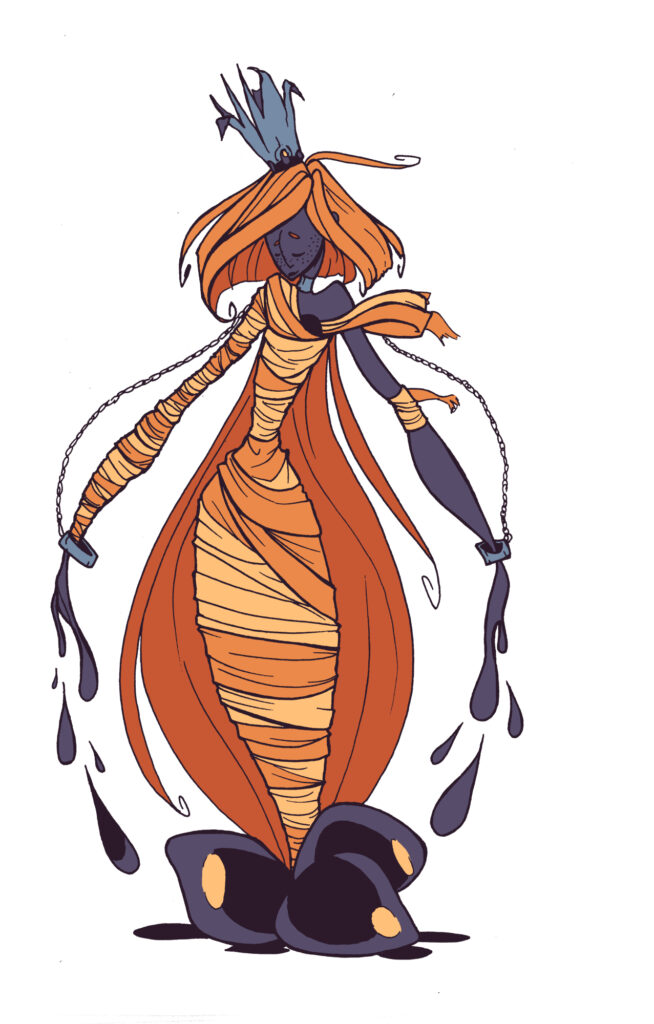
persephone
(PERSEPHONE/KORE/CORE)
Goddess of spring and queen of the Underworld.
In some versions of the myth Persephone’s story is one to have grown and changed in some aspects over the course of time. In her original myth she was said to have been the lovely and beautiful goddess of spring and since she was the daughter of Zeus he was able to give her hand in marriage to his brother, Haides. Haides has a huge feeling he couldn’t convince the girl to follow him quietly and decided to kidnap her instead. Her mother, Demeter was absolutely distraught at her disappearance and searched for her high and low until she realized what had happened and, in her fury refused to let spring and the harvest return proper until Zeus consented to fix it. Unfortunately, in this time, even though Hermes was sent to save Persephone from the horrible clutches of the Underworld, she had already eaten the ‘fruit of the Underworld’ (pomegranate seeds) and was forced to spend one third of the year with Haides (during the winter) and return to the Earth in the spring where she would help her mother during the summer months.
In other versions of this myth it was said that the reason Persephone was so far away from the other gods was because she was being sought after by Ares, Hermes and Apollo, granting her various gifts before Demeter put a stop to it and set Persephone far far away from Olympus. In another she was not entirely abducted but perhaps went willingly or even conspired to follow Haides into the Underworld. It was also said that in some versions where she might have been abducted, she fell in love with Haides and when she was stated to return to the Earth she herself ate the pomegranate seeds so that she might see Haides again.
In other unrelated versions of this story, Persephone only ever appeared as Haides’ consort and Queen of the Underworld who eventually grew to be the representation of spring (in a nearly reversed-myth) which may have had something to do with her massive cult following. As she was the goddess who presided over the judgement of the souls of the dead, Persephone was a rather large influence on ancient Greek culture as a figure most terrifying but equally most the most loved and adored.
As Queen of the Underworld, much like Haides it was bad luck to reference her by name. In some accounts while she was sister to Despoina, in other accounts she was referenced as a newer version of the older god whose name could not be spoken unless initiated into the cult. Persephone was often called the daughter of Zeus and Styx.
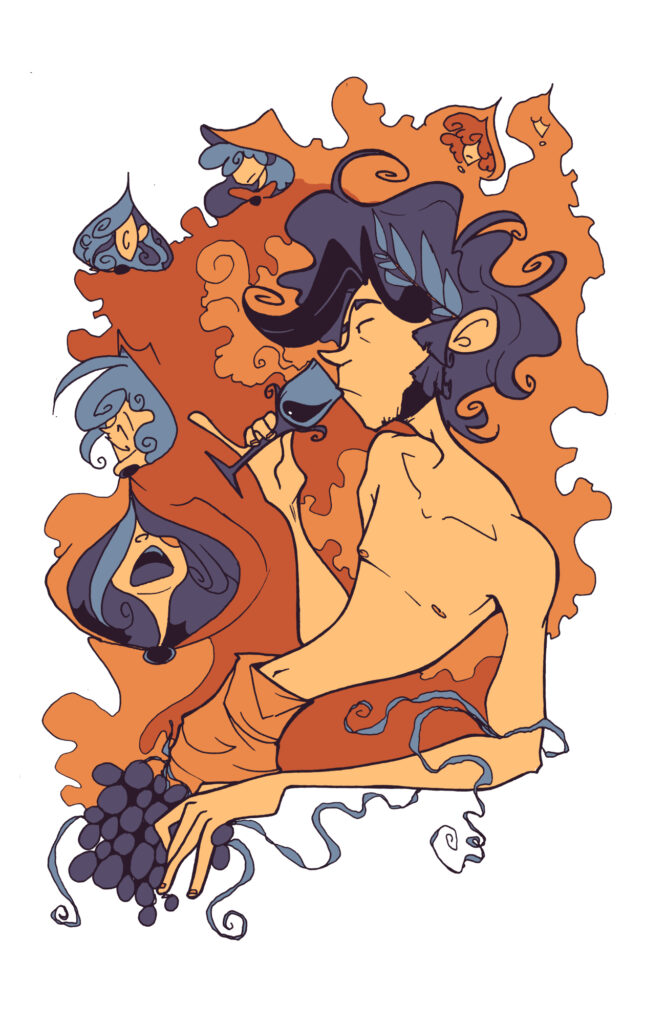
dionysos
(DIONYSOS/DIONYSUS)
God of wine, vegetation, pleasure, festivity, madness and wild frenzy.
In some versions of the myth, Dionysos was the son of Zeus and Semele in which Hera grew so jealous she tricked Semele into asking Zeus to show himself in his full glory. In some very strange oath and weird rule that Zeus was bound to do this, he did so and Semele was burned to death by the heat of his lightening bolts. In some versions Zeus has Hermes pull Dionysos out of the fire, in other versions Zeus plucked him from the fire and sewed the child into his thigh to carry him to term…
Anyhow, after Dionysos’ birth from the thigh of Zeus he was given to Selenos and various mountain nymphs to be raised until they located his aunt and her husband who gladly took him on as their own child. Unfortunately, Hera, in her continued rage, decided that she would make the couple go mad killing not only themselves but their children as well, leaving Dionysos alone.
Later, Dionysos faced various very odd exchanges between himself and various mortals. He was firstly exiled by a Thrakian king for, seemingly no real reason at all. Understandably, Dionysos took offence and caused the king to go mad so that he began pruning his own child to death (and later himself). Secondly, a king of Thebes refused to accept his divinity, which again, Dionysos took offence to and set this King’s daughters in a frenzy so that they tore their father apart limb from limb. Finally, a group of pirates managed to capture Dionysos and, refusing to acknowledge him as a god, were ready to sell him into slavery. Again, extremely offended, he infested the ship with phantoms of creeping vines and wild beasts so that the pirated jumped ship, turning into dolphins as they hit the water.
In myths where Dionysos’ divinity isn’t put into question, the god took to instructing youths like Ikarios into the art of winemaking. The unfortunate downfall was that when Ikarios showed the shepherds his wine and had them taste it, they were convinced it was some sort of poison and killed Ikarios. Dionysos turned him into the contellation Bootes after, maybe, mourning his death a little.
While Dionysos wasn’t known for having very many consorts (the most notable and perhaps maybe even one of very few was Ariadne, left behind on his island by Theseus). However, the god did have a very strong cult-following which primarily comprised of independent women who were said to have been ‘wild and mad’. He was known as the god, Bakkhos in some cases his following was known as the ‘cult of Bakkhos’.
In a final noteable myth, merely in that the thought/idea behind it was rather endearing was the fact that Dionysos traveled to the Underworld in search of his mother, Semele, and brought her to Olympus so that Zeus could turn her into the goddess, Thyone.
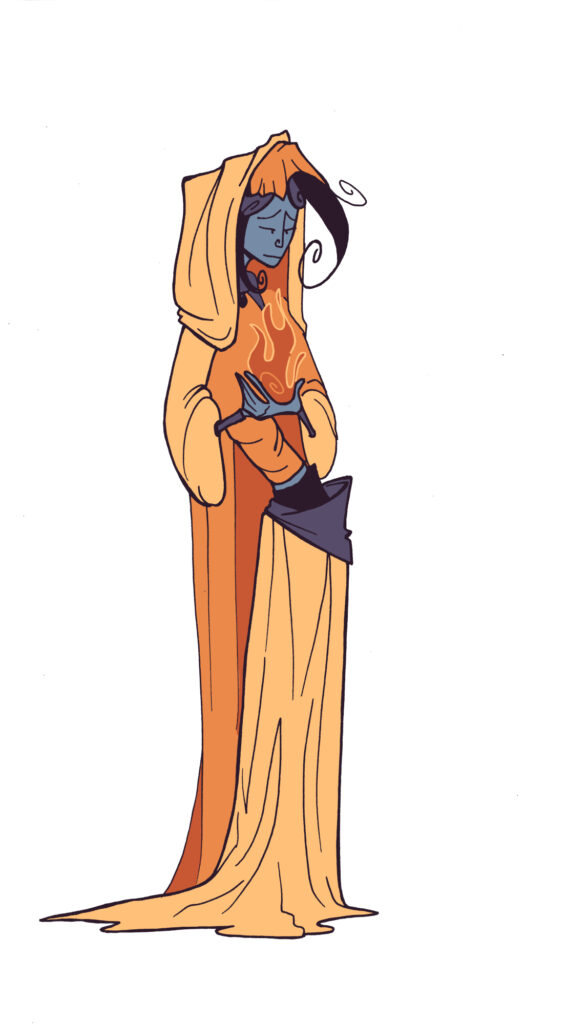
hestia
(HESTIA)
Goddess of the hearth, architecture, the right ordering of domesticity, the family and the state.
In some versions of the myth, Hestia was both the eldest and youngest daughter of Kronus and Rhea. The eldest in that she was physically born from Rhea first, youngest in that she was the last to be disgorged from Kronus when Zeus socked him in the stomach for swallowing his siblings. It was said that Hestia was one of the few (if the only) goddess to be capable of rejecting the marriage pursuits of Poseidon and Apollo without repercussion and swore herself to perpetual chastity. She couldn’t be swayed by Aphrodite in the least and was often considered her compliment in that regard.
While often there was debate on whether Hestia or Dionysos was the last Olympian, it was said that Hestia had first rights to the position but, due to her more passive and friendly nature (and since the hearth was a very immovable concept) she was often replaced with the more brutish, pompous and loud, Dionysos. Not every ancient in Greece agreed with this, however, and depending on the artist’s depiction of the twelve Olympians she was often the one who took her place as the twelfth Olympian.
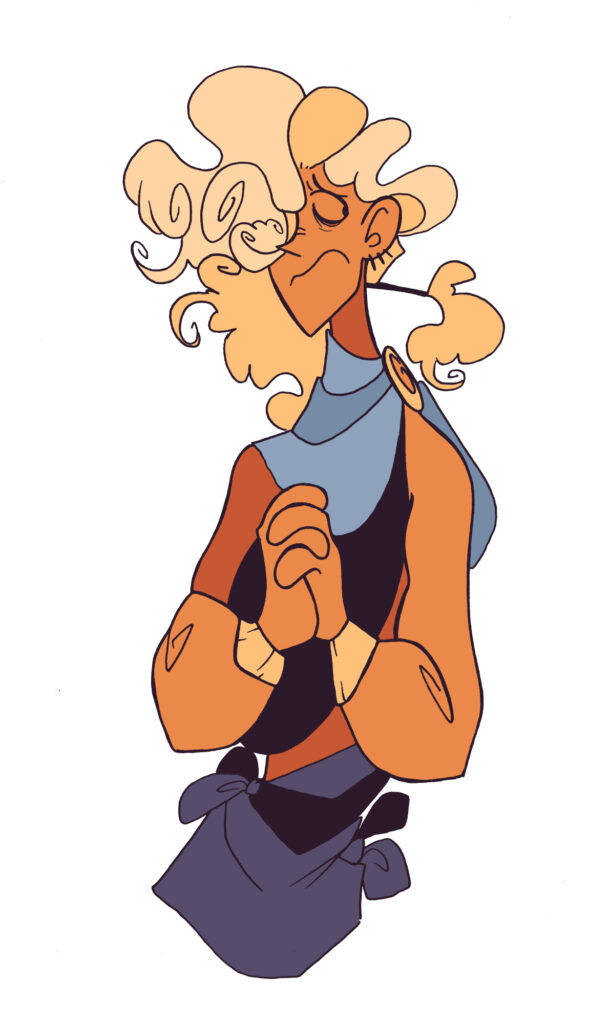
phaethon
(PHAETHON/PHAETON)
God of the shining rays of the sun.
In some versions of the myth… Phaethon had rather poor luck. The eager son of the titan, Helios asked his father if he could drive the chariot one time and Helios, quite reluctantly, offered Phaethon the chance to do so. Unfortunately, Phaethon was extremely inexperienced, Helios, weirdly enough, not teaching Phaethon anything about running the chariot before allowing him the chance to drive it. The end result of this escapade, naturally, lead to Phaethon losing control of the chariot and setting fire to the Earth.
This entire thing wasn’t so easily fixed by Helios and so, Zeus was enraged by the display, struck Phaethon down with a thunderbolt and hurled his flaming body into the Eridanos river. It was said after this the minor deity was placed into the stars as a constellation: Auriga (or the ‘charioteer’). It was also said that in antiquity Phaethon’s name was used to name the planets: Jupiter or Saturn.
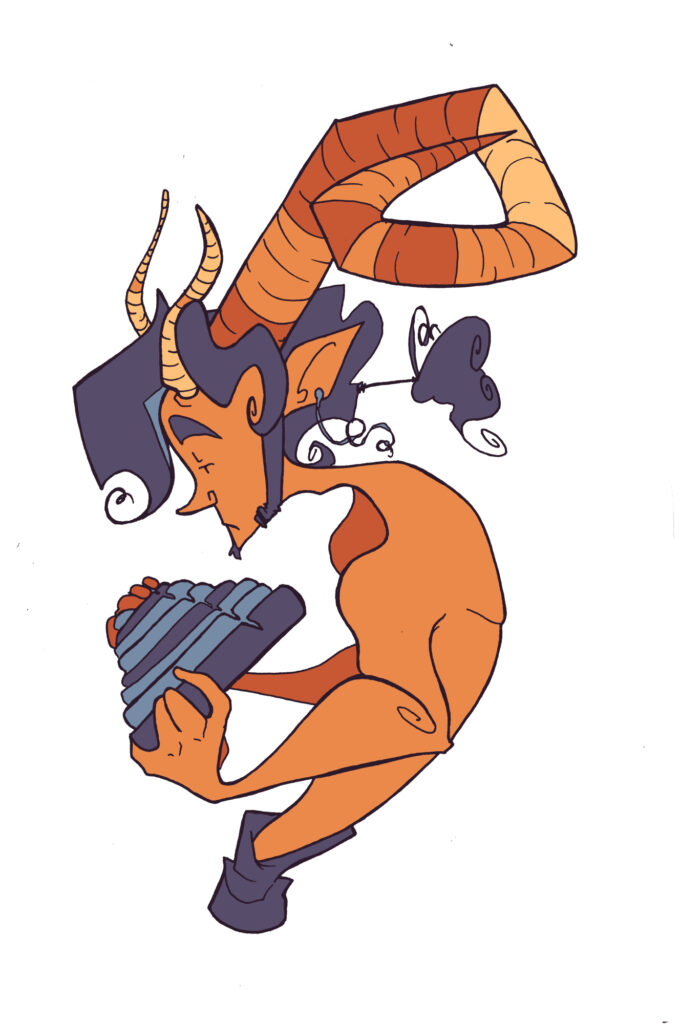
pan
(PAN)
God of the wild, rustic music, impromptus (music), shepherds and flocks and the nature of the mountain wilds.
In some versions of the myth Pan was said to have been a far more horrible god than his father Hermes. While his father was a trickster, Pan took his tricks to a point in which most folks would have deemed ‘too far’.
Pan’s origin in mythology dates back to even the time of the Titanomachy in which Pan’s contribution was to let out a wild screech causing the Titan’s to scatter in their great horror.
Later, Pan would reside mostly in the wilds, the mountains and forests where, often his various escapades with nymphs involved Pan making unwanted advances on them and insisting to a point in which they eventually fled him. They would pray to other gods for an escape and would then be transformed into trees or flowers. In one specific case, Syrinx was turned into the reed plant and, not knowing which reed was Syrinx specifically, Pan cut several and affixed them together in a small flute iconic to his image. In another instance, Echo was said to have the most beautiful voice and, scorned the love of Pan. In his rage he tore her to pieces, spread her across the Earth. Afterward her voice could be heard in the echos of wide open spaces.
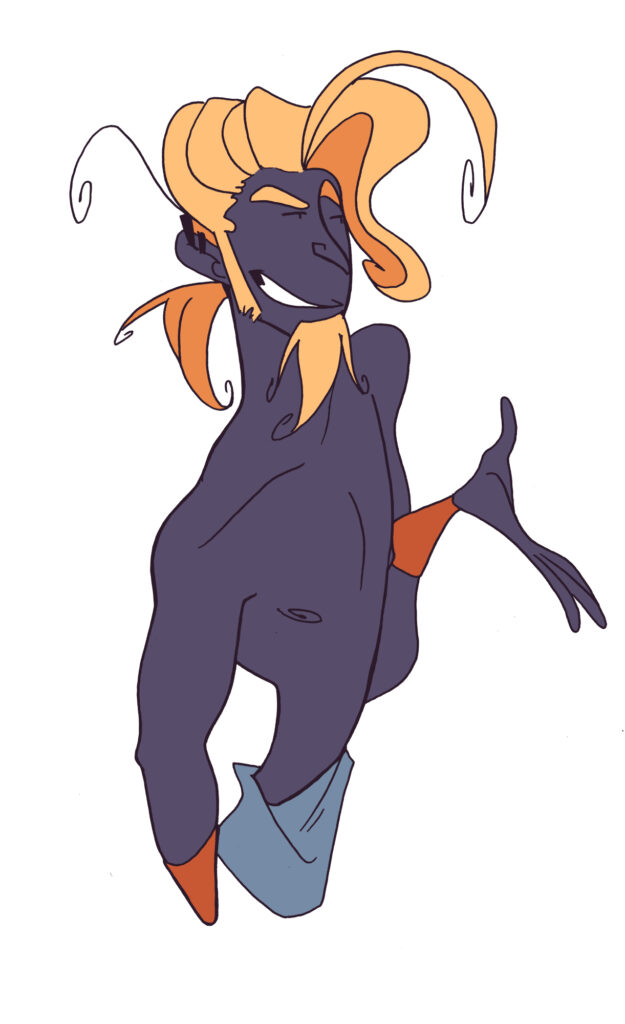
preipos
(PRIAPUS)
God of livestock, fruit plants and male genitalia.
In some versions of the myth Priepos was often depicted as a very short man with a very big penis. Often, ancients created small statues of the god and his large member to place in their gardens and encourage fertility (while doubling as a scarecrow to keep the birds away). Preipos was also frequently depicted with Dionysos and Hermes for very obvious phallic reasons.
It was said that Preipos was either the son of: Aphrodite and Dionysos, Chione and Dionysos or the son of Hermes, Zeus or Pan. In his most properly known myth, Preipos was the son of Aphrodite and was cursed by Hera (with impotence, ugliness and foul-mindedness) when Paris exclaimed that Aphrodite was far more beautiful than Hera would ever be. When he was born, none of the other gods wanted him on Olympus so they cast him out, setting him on a countryside where shepherds raised Preipos as their own.
Unfortunately this also meant he was picked up by Pan and thus wasn’t raised under a very good influence.
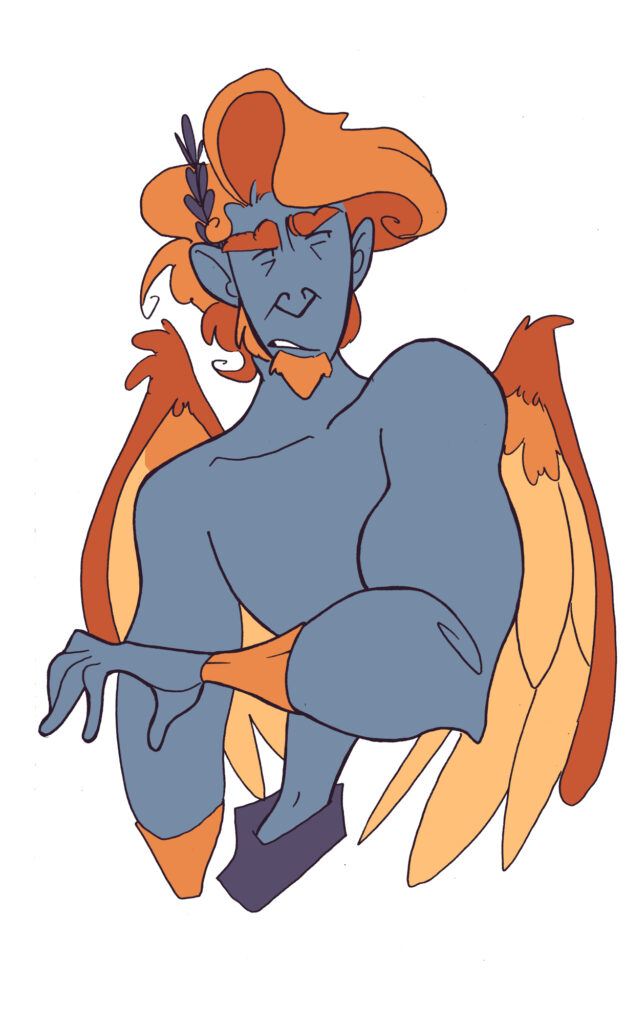
Zelos
(ZELOS/ZELUS)
God of rivalry, envy, emulation, jealousy, competition and zeal.
In some versions of the myth Zelos was sometimes considered a deity, other times considered a daimon. He was also often confused with Phthonus who was considered the daimon of romantic jealousy.
Zelos’ primary function was to balance against his sister’s function, Nike who was a far more embellished goddess in terms of participation in mythology. The most notable thing about Zelos was the fact that he often stood by Zeus’ throne, casting a competitive eye on passers by.
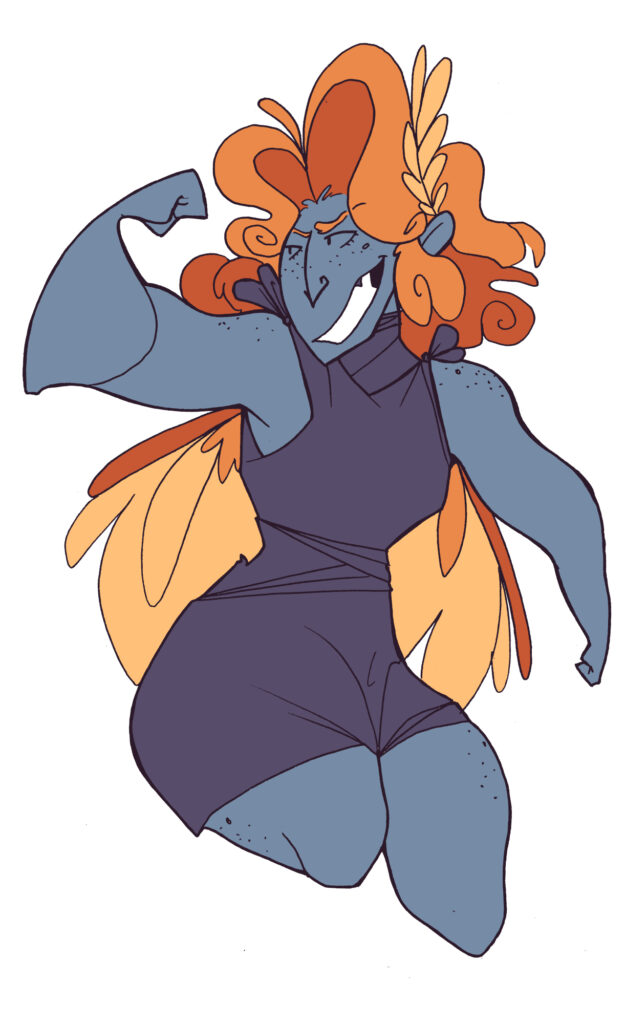
nike
(NIKE)
Goddess of strength, speed and victory in both war and peaceful competition.
In some versions of the myth Nike was best known as having been appointed Zeus’ charioteer in the Titanomachy, brought forth to him by her mother, Styx. It was also said that Nike blessed victors in battle with their own laurel crowns.
Nike was depicted in a variety of different ways, including wings, wreaths and sashes (to crown victors) and supposedly a lyre as well that she played and basked victors with heroic victorious song. Nike was quite equipped and seemed all to eager a character to celebrate any and all victory, the bigger the better, but she was definitely not one to snub even the smallest of victories.
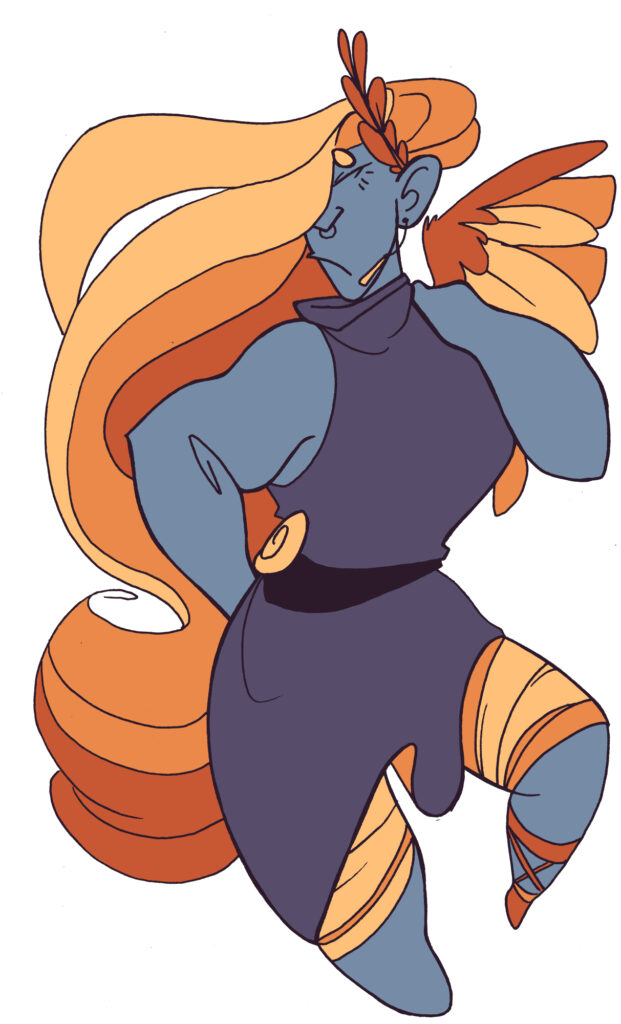
bia
(BIA)
Goddess of force, anger and raw energy.
In some versions of the myth Bia, along with her siblings: Zelos, Kratos and Nike, were all close companions of Zeus and were especially helpful to him in the Titan war. She was one of the few gods mentioned often alongside the Olympians who had very little speaking roles and was merely present. Bia was created, perhaps, as more of a personified concept, she was still represented in the occasional artwork or statue figure.
Her only notable role aside from participating in the Titanomachy with her siblings n aiding Zeus was her role in the myth of Prometheus. Here Bia stood overseeing Hephaistos binding the titan to his eternal prison and punishment. In other versions Bia took part in holding Prometheus down while his hands were bound.
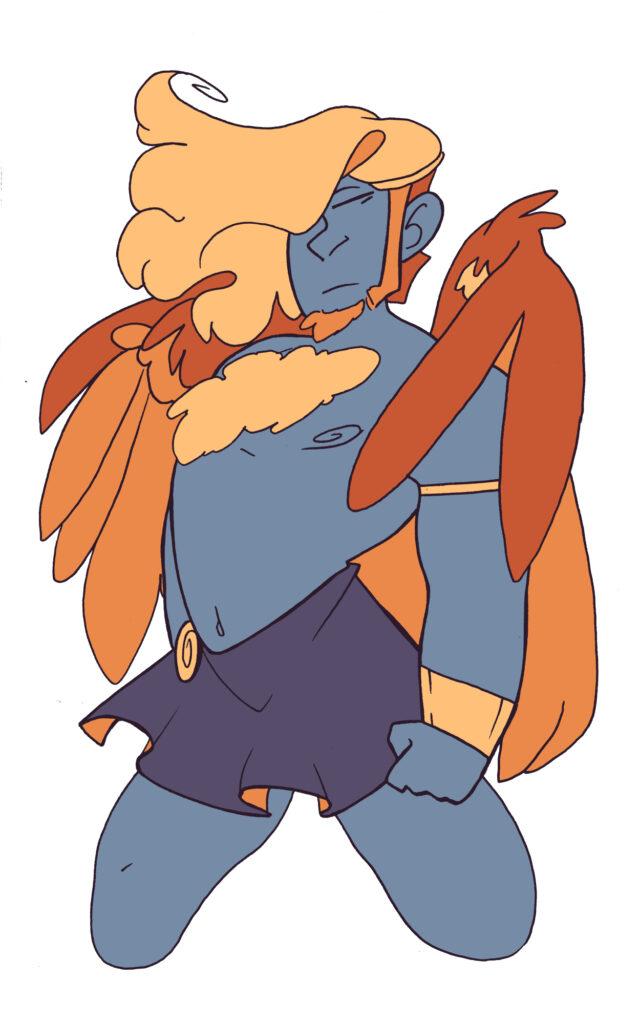
kratos
(KRATOS/CRATOS)
God of strength, violence and power.
In some versions of the myth not only was Kratos mentioned alongside his siblings as champions and companions os Zeus in the Titanomachy, but he was also mentioned alongside his sister in the myth of Prometheus in some cases. It was said that he played a mildly larger role in this myth, the two siblings came forth as agents of Zeus, Kratos implored Hephaistos to chain Prometheus to a rock as a crime for his punishment of stealing fire from the gods and giving it to mortals.
It was said that in this particular version of the myth, Kratos was rather rude about the entire thing, insulting both Prometheus and Hephaistos the entire time and absolutely agrees with the punishment given to Prometheus, advocating this brutal violence.
It was said that Kratos’ character, while not more present than this in mythology, was a recurring motif in various paintings in the eighteenth and nineteenth centuries.
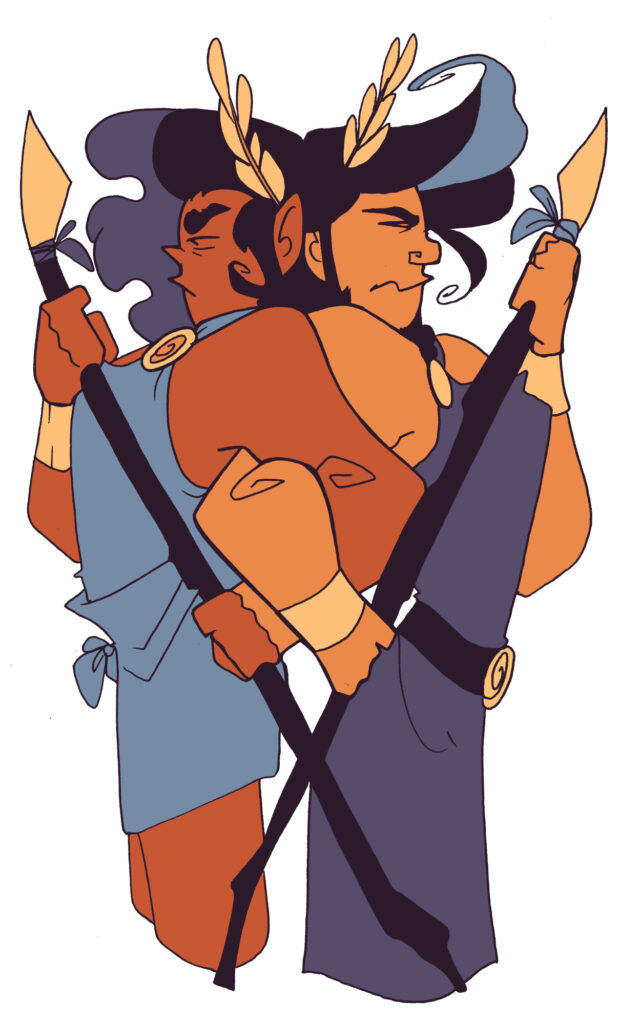
alexiares & Aniketos
(ALEXIARES) & (ANIKETOS/ANICETUS)
Gods of guarding Olympus.
In some versions of the myth these two were the sons of Herakles, born after Herakles died and was made a god. He married Hebe then and had these two sons perhaps in honour of his brute strength they were made protectors of Olympus. It was also said that, in the similar idea that they were made protectors of Olympus, they were also considered guardian and protector gods of towns and citadels.
Their names also reinforced the idea of protection and fortification, Alexiares meaning ‘he who wards off war’ and Aniketos meaning ‘the unconquerable’.
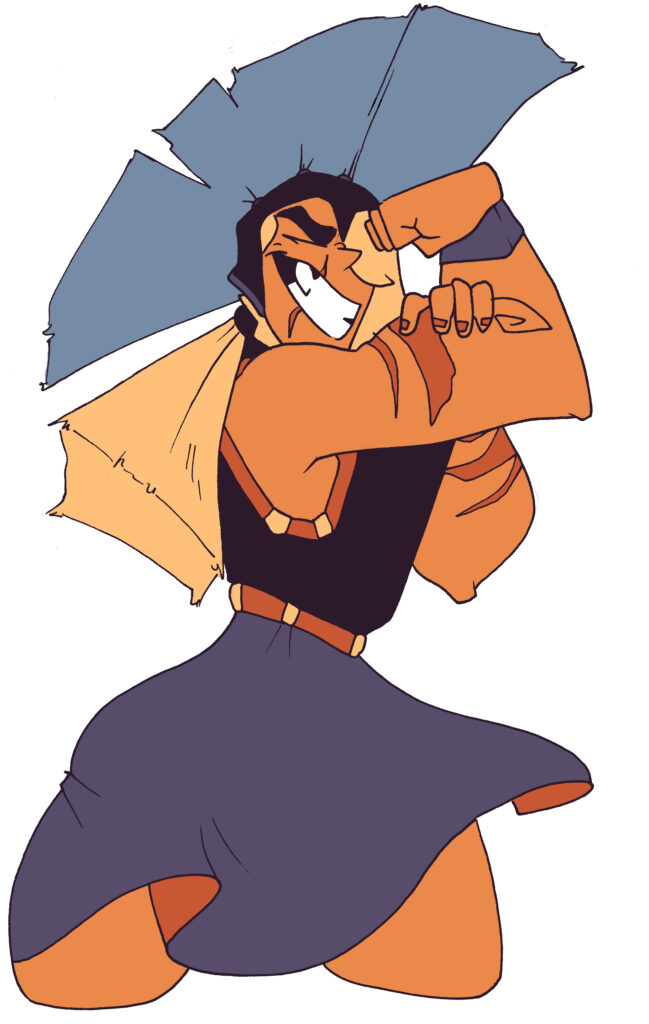
enyo
(ENYO)
Goddess of war, destruction, conquest and blood.
In some versions of the myth Enyo was either considered a minor deity or personified spirit/daimon of war. She was often spoken of in relation to Eris. In some cases she was even interchanged with and considered the same as Eris. In some versions, Enyo was the close consort and companion of Ares and in some cases she may have been (or also was) his sister or mother. This relation was really not entirely surprising.
It was said that Enyo participated in the horrors in the war between the Greeks and the Trojans, joined by Eris, Phobos and Deimos. The four were said to have been depicted on the shield of Achilles.
Enyo was said to have been so involved and excited about war she often didn’t even pick sides such as in the battle between the Typhon and Zeus. Her name was dropped quite nearly at every mention of war.
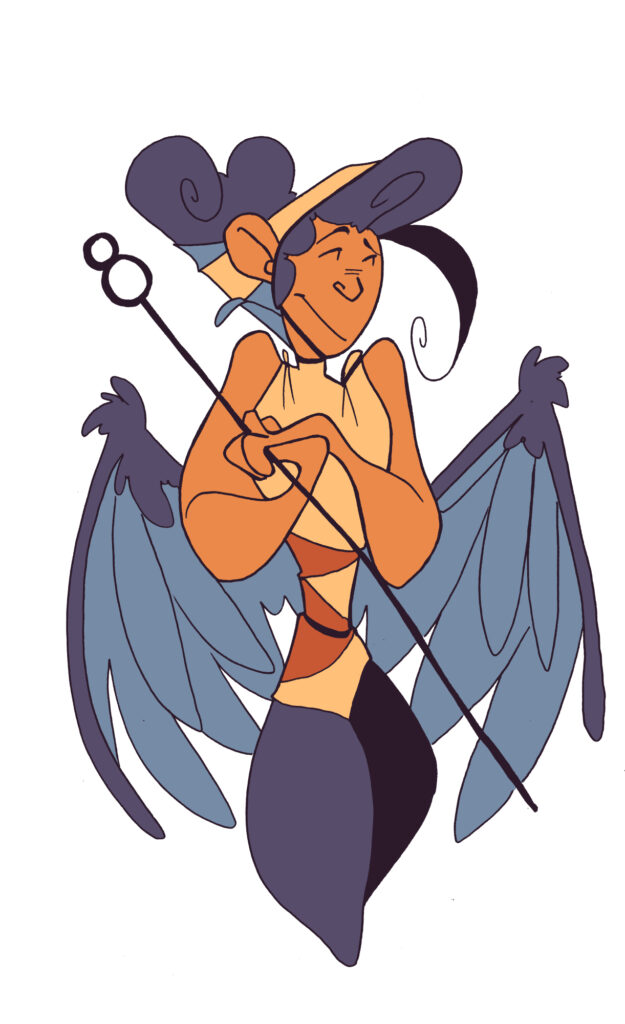
iris
(IRIS)
Goddess of the rainbow and messenger of the gods.
In some versions of the myth it was said that during the titan war, Iris and her sister parted ways and Iris became the messenger of the Olympians and the two were considered divine enemy messengers. Iris was known to have golden wings and walk the length of rainbows to carry out her deeds.
Iris was also known to be one of the servers of nectar and ambrosia to the gods and similar to Hermes, she was known to be a messenger between gods and mortals and travelled the speed of the wind from mortal land to sea to the Underworld itself. She was the original messenger of the gods until she was replaced by Hermes.
Iris was also said to have taken part in the war on Troy in a specific instance where she disguised herself as a Trojan woman and stirred up trouble with the other Trojan mothers who set fire to Aineias’ ships so that they could not leave Sicily.
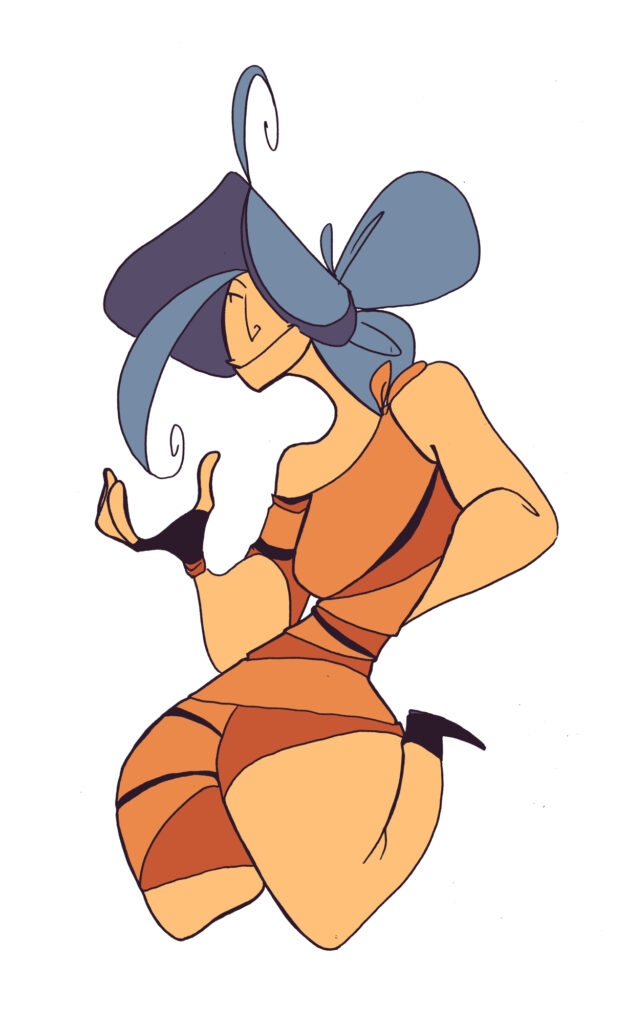
ARCE
(ARKE/ARCE)
Goddess of sending messages to the Titans.
In some versions of the myth Arke was considered the messenger who turned on the Olympians and opposed her sister, Iris during the Titanomachy. Due to her betrayal of the Olympians, Arke was given a very similar punishment as the Titans when they lost the war. While she was cast down into Tartaros, it was not before her amazing iridescent wings were torn from her very body. This happened at none other than the hands of Zeus who later gave Arke’s wings to Thetis who eventually gave them to her son, Achilles (often known as Podarkes ‘feet like the wings of Arke).
To add greater insult to injury, Arke was often the name given to the second faded rainbow living in the shadow of the first, forever cursed to live in her sister’s shadow.
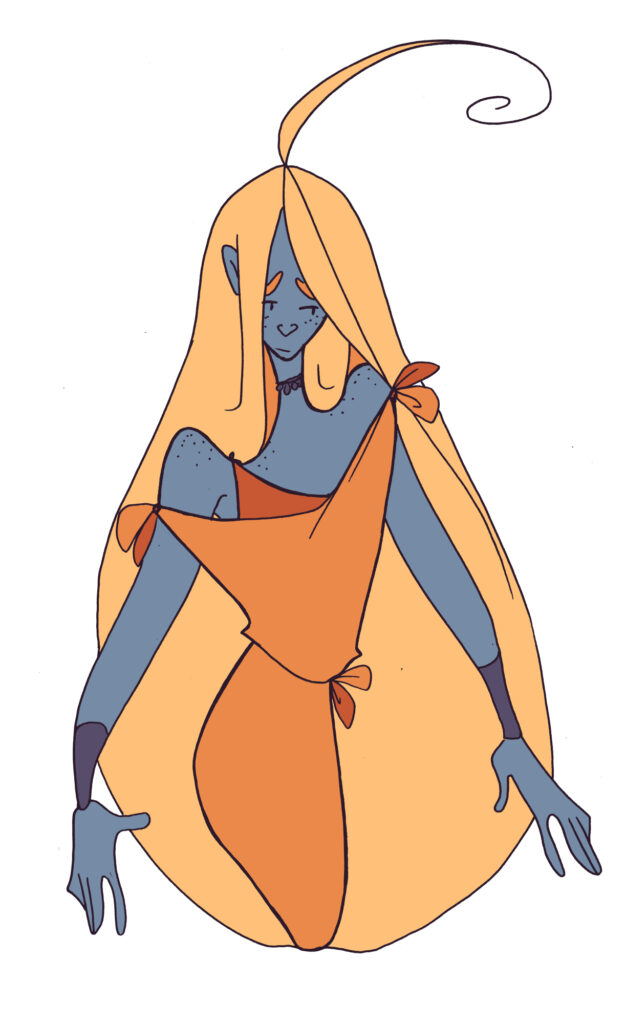
despoine
(DESPOENA)
Goddess of the mysteries of Arcadian cults.
In some versions of the myth Despoine was Demeter’s second daughter, not by Zeus but by Poseidon. It was said that while her sister Persephone was known in her ‘true name’ as Kore, Despoine’s true name was never revealed as only individuals initiated into her cult could be given her name.
While Despoine wasn’t particularly well known through stories in mythology she was very well supported and worshipped in antiquity. Often, Despoine was worshipped alongside her mother, Persephone, Artemis and occasionally Hekate.
As she was a rather mysterious sort, it was to no real surprise that Despoine kept to herself and was a rather quiet goddess.
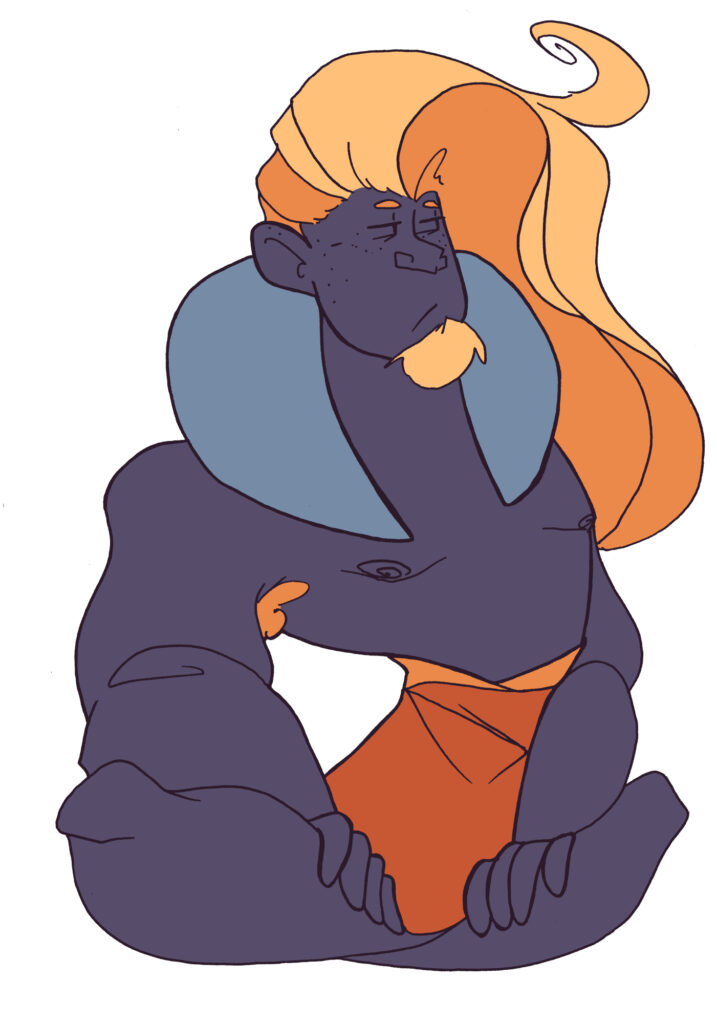
AIOLOS
(AIOLOS/AEOLUS)
God of the winds. Often considered ‘king of the winds’.
In some versions of the myth Aiolos was known as the divine keeper of the winds and the mythical floating island of Aiolia. He kept storms closed in a cave on his island and only set any of them free at the (only legitimate) requests of very powerful gods to wreak havoc on mortals.
Odysseus was known to have come to Aiolos’ island and was given a small bag of winds to carry him all the way back home. Unfortunately his sailing companions… tore the bag open in search of gold and destroyed all of that chance.
In other versions of the myth, Aiolos takes on very similar attributes to the primordial god of the sky, Ouranos. Aiolos had six sons and daughters joined in wedlock, all of whom were locked behind a prison of bronze. Very similar to that of Ouranos’ titan children.
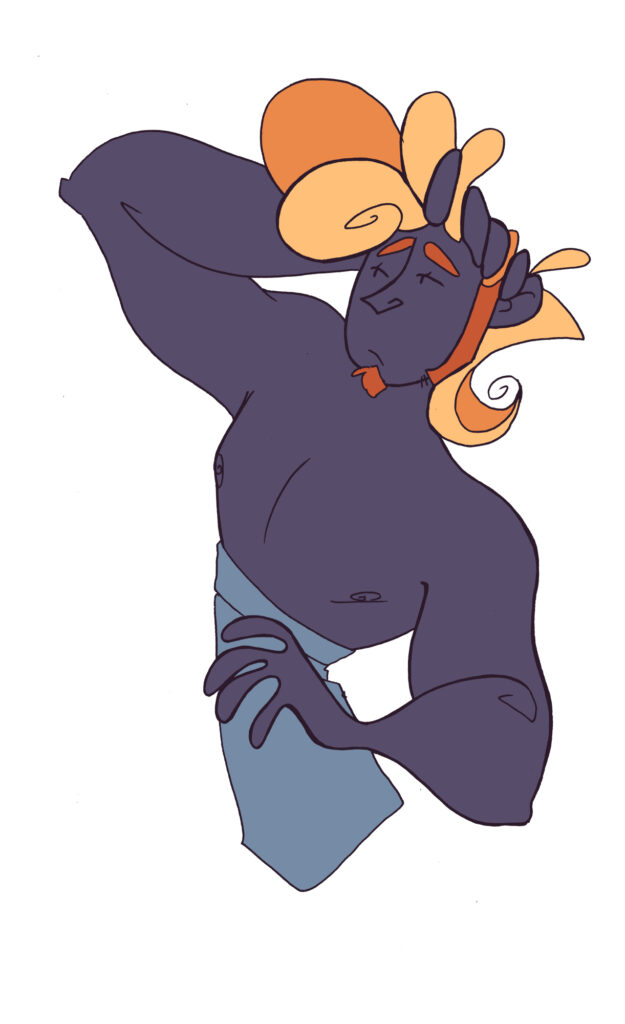
EURoS
(EURUS)
God of the east wind and the autumn season.
In some version of the myth it was said that Euros’ parents were Astraios and Eos and he was a part of four siblings that made up the four directional winds and called themselves the Anemoi. It was said that Euros was well known for bringing the rain and oftentimes the warmth which made him a rather enjoyed character in mythology although he didn’t play any large notable roles in any particular stories. Euros typically hung around the palace of Helios and was generally mild-mannered.
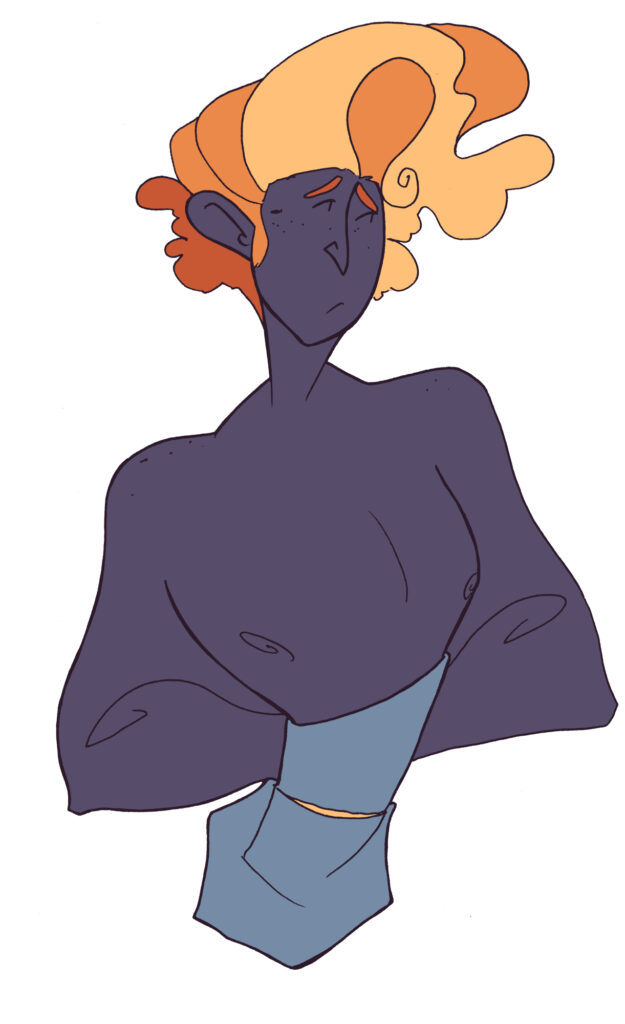
notos
(NOTOS/NOTUS)
God of the hot south wind.
In some versions of the myth Notos was known as a rather intense hot wind that came just after midsummer. He was not a character (or wind) typically liked by folks of antiquity as he was the representation of wind and storms that often destroyed crops and was then hugely feared for it.
He also was not hugely present in mythology but mostly notable as one of the four Anemoi who represented directional wind. It was said that he resided mostly in Aithiopia.
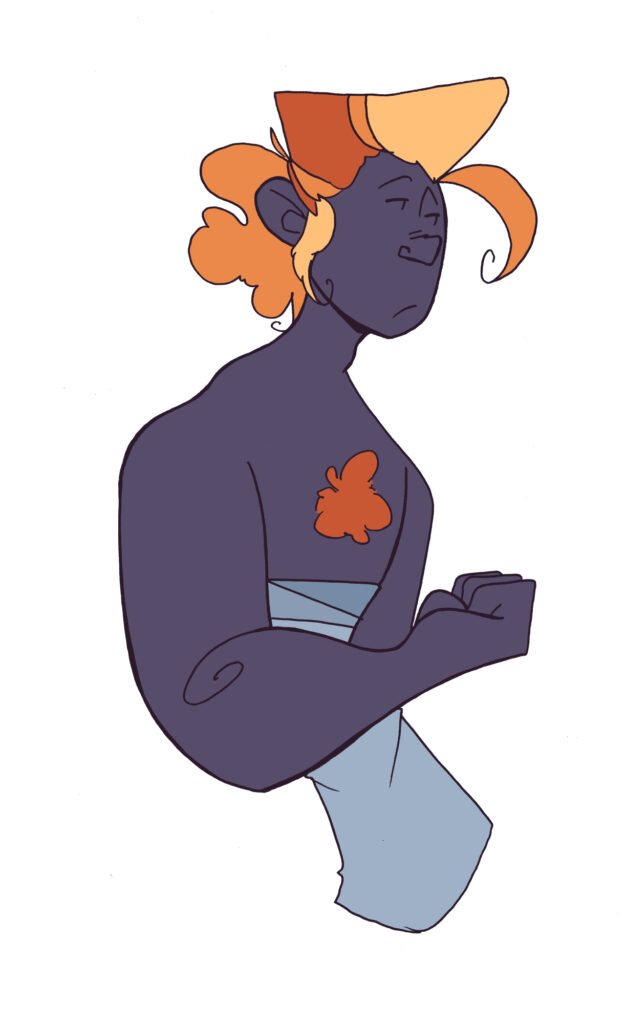
zephyros
(ZEPHYROS/ZEPHYRUS/ZEPHYR)
God of the gentle west wind.
In some versions of the myth Zephyros was said to be the gentle wind and the messenger of spring. He was said to have had a few varying partners depending on the myth specified. His wives included Iris (goddess of the rainbow), Podarge (a harpy) and Chloris (with whom he fathered Karpos, or “fruit”). It was said that Zephyros fought for Chloris’ affections againts his brother Boreas and Zephyros was the one who won her affections.
In his best known appearance in mythology, Zephyros vied for a young man’s affections (Hyakinthos), against Apollo. It was said he caught Apollo and Hyakinthos hanging out with one another. Apollo was showing off a little and giving a disk a little toss. In a petty sort of way, Zephyros nudged the current of air the disk was flying on and it made a sour turn into Hyakinthos’ head killing his lover instantly.
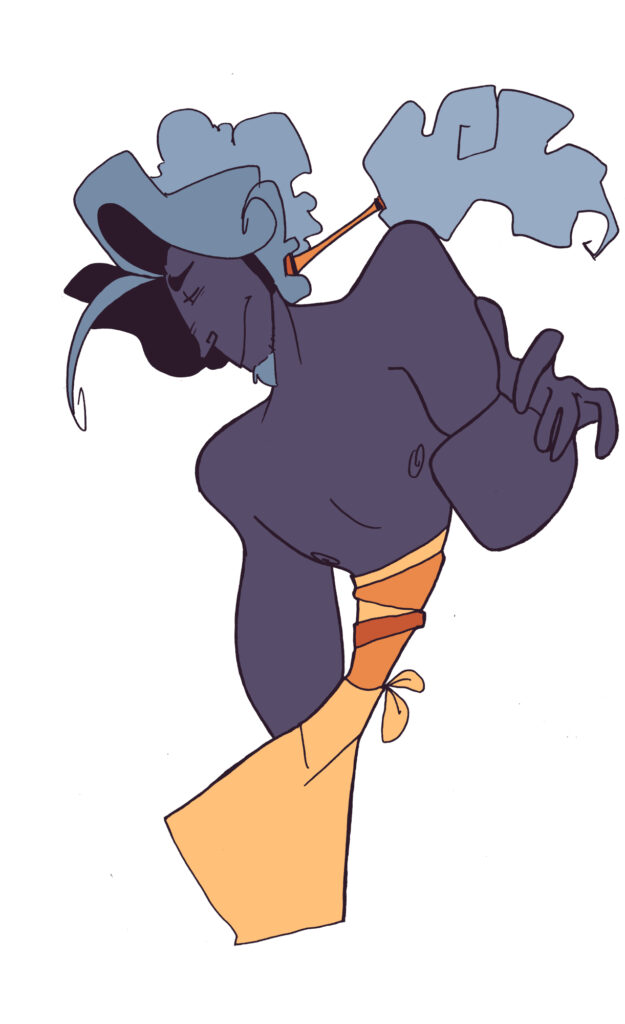
boreas
(BOREAS)
God of the cold north wind.
In some versions of the myth Boreas was not only the god of the north wind but also the bringer of winter. He was often depicted as having a very rough temper and very strong. Although he was often mentioned as having snakes instead of feet he was more likely depicted in imagery as having winged feet instead.
Oddly enough it was said that often Boreas and his brothers (Anemoi) bore horse-like imagery and often represented as wind in the shape of horses. Most specifically, Boreas and Zephyros were mentioned as taking the shape of wind-stallions and impregnating the mares in the spring.
Boreas’ most notable myth included him taking a fancy to Orithyia (an Athenian princess) and when his advances did not enchant her in the least, Boreas took to his horrible temper and kidnapped her instead. He wrapped her in a cloud and had his way with her, fathering two children: Khione and the Boreads (or Kleopatra in some cases).
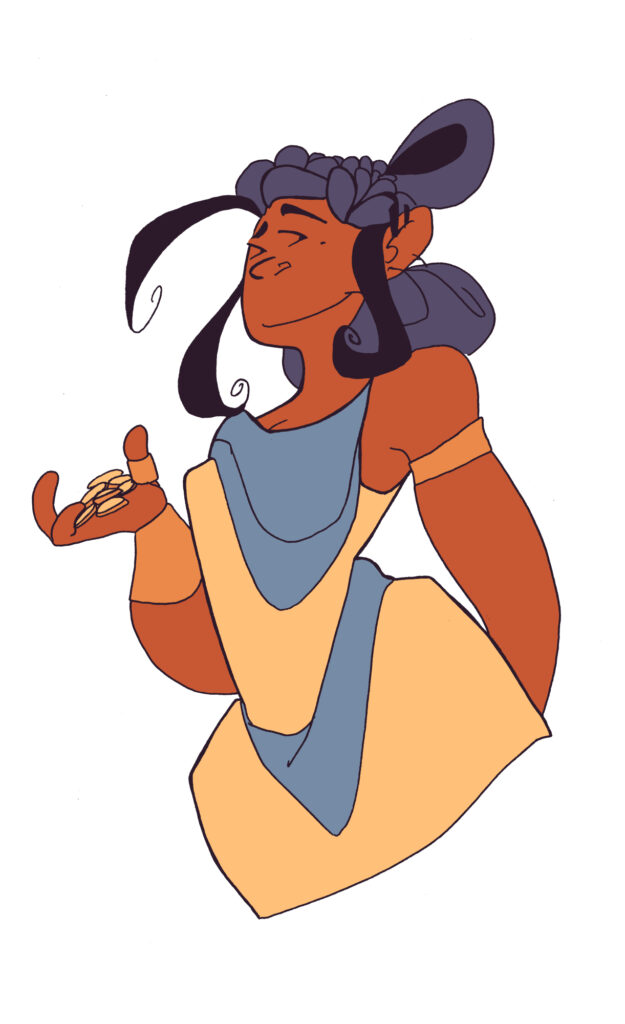
tykhe
(TYKHE/TYCHE)
Goddess of fortune, chance, providence and fate.
In some versions of the myth Tykhe was often depicted in a rather good light all things considered. She was not a figure ancients toyed with as she was the goddess of good fortune but of luck that could have easily gone sour. She was revered and worshipped greatly, anyone would have prayed for good fortune and a pleasant fate.
Tykhe was also the face of coinage in antiquity and was depicted with various imagery: ship rudders (options), a ball (unpredictability) and/or a wheel of fortune. She is also sometimes associated with the constellation: Virgo.
In some cases, Tykhe was considered the opposite to Nemesis who kept the gifts of good fortune in check. Tykhe bestowed great and various gifts while he counterpart took them away to spite hubris and bad energy.
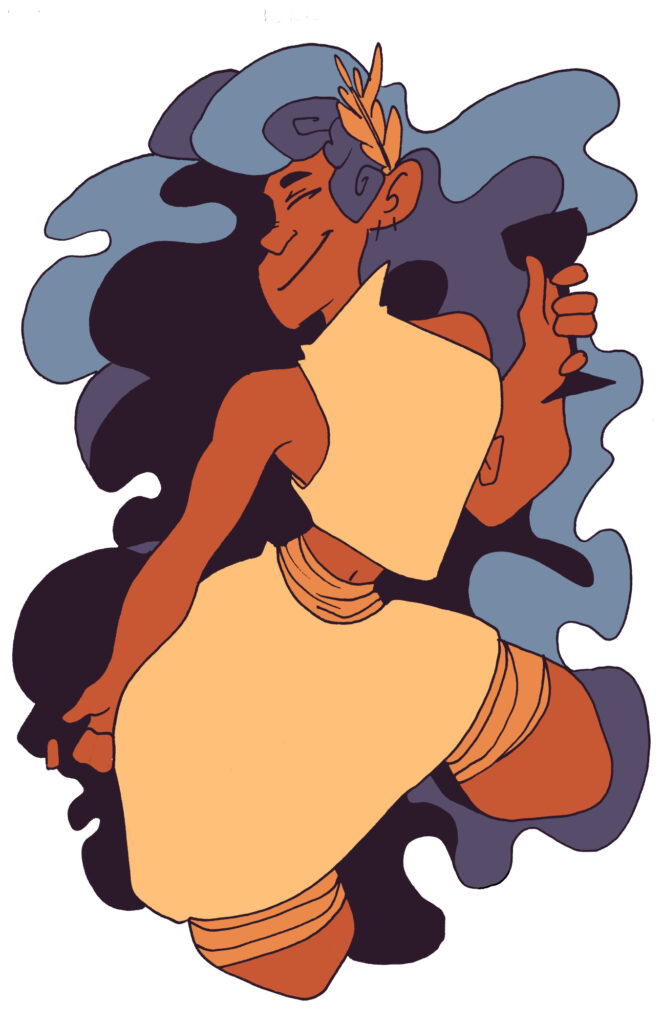
HEBE
(HEBE/GANYMEDA)
Goddess of eternal youth.
In some versions of the myth Hebe was the initial cupbearer of the gods and served them ambrosia and nectar until she was married to Herakles and and succeeded by Ganymedes. Ironically despite her being the first cupbearer she often took on Ganymedes’ name in a more femme-version: Ganymeda. Otherwise she was also known to draw baths for Ares, helped Hera into her chariot and acting as a herald or attendant to Aphrodite, who she danced with often.
In myth she was the only goddess known to restore youth and give eternal youth to mortals. She was the youngest of the gods and, in turn also responsible for keeping all the gods young and beautiful. This meant she was very highly appreciated by them.
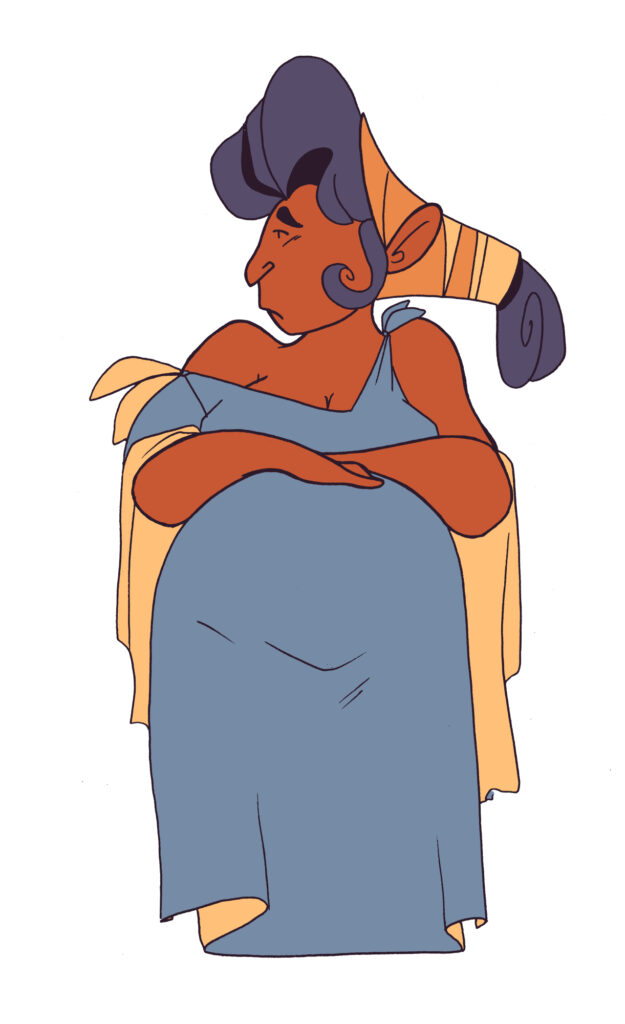
Eileithyia
(EILEITHYIA/ILITHYIA/ELEUTHYIA/ELEUTHIA/ELYSIA/ELUTHO)
Goddess of childbirth and labour pains.
In some versions of the myth Eileithyia was often seen in mythology in aiding goddesses and mortal women alike in the process of childbirth. She was very closely associated with Artemis and Hera.
While Eileithyia did appear in several myths in which her name was mentioned in relation to goddesses and mortals, she most notably played a role in the myth of Herakles. It was said that she was sent by Hera to stop the birth of Herakles (as he was an illegitimate son of Zeus). Hera demanded that Eileithyia keep ahold of the birth so that both mother and son would perish together and while this was going to plan, the handmaiden spotted Eileithyia in her closed-off pose by the doorway and, in order to surprise Eileithyia shouted at how a son was born! This worked, Eileithyia let go of her magical grip on the womb and Herakles was born. Miffed at being tricked, naturally, Eleithyia turned the handmaiden into a polecat (ferret).
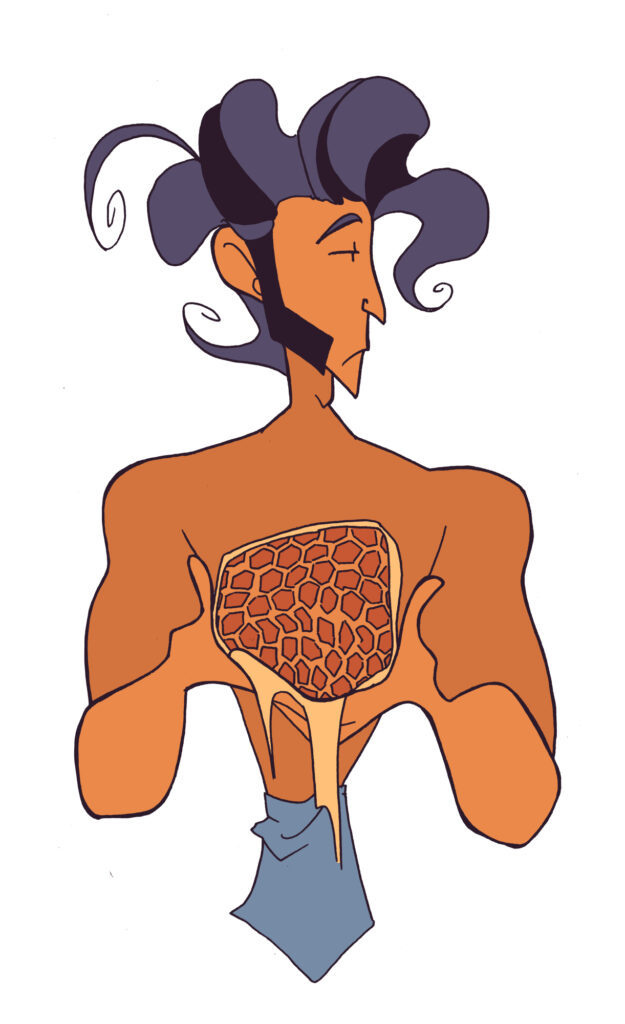
aristaios
(ARISTAEUS)
God of shepherds and cheesemaking, beekeeping, honey and honey-mead, olive growing and oil milling, medicinal herbs and hunting.
In some versions of the myth Aristaios was not only the minor deity of very many useful trades and commodities but also the minor god of Etesian winds. These winds were the gentle cool breezes often come about as a respite from the horrid heat of summer.
His mother, Kyrene, was a woman who preferred the hunt to ‘womanly arts’ and found herself spirited away by Apollo who made her the founder of the city after her own name. Here she gave birth to Aristaios and it was said he was taken by Hermes to be fed nectar and ambrosia and to be made immortal by Gaia. Afterward Aristaios learned all of teh most useful trades by various Olympians (Apollo, Artemis, Dionysos, Demeter). He passed on his knowledge to mortals so that the might have an easier time in life.
Near the end of his mythology, Aristaios’ bees began to die and in great distress he went to the fountain of Arethusa and was told to establish altars and sacrifice cattle to them and told to leave these cattle carcasses there. When he did all this, new swarms of bees rose from these carcasses and all was well once more.
MAIN PAGE | PRIMORDIALS | TITANS | HEROES | LADIES | LOVERS | MONSTERS